11 Best Academic Writing Tools For Researchers

For many people, the academic writing process can be a daunting and exhausting experience. Papers and reports can take hours or days to complete and require intense dedication to perfect. However, there are tools that can make the process much easier for those who need them most. It is crucial to maintain academic integrity while leveraging these AI writing tools to ensure the quality and authenticity of your work.
If you find yourself struggling with long-form writing projects, these tools will help you work smarter instead of harder.
This article is organized into roughly 3 stages of writing:
Organizing the manuscript
Summary 💡 Use Jasper to get unstuck – ask it to brainstorm or write an outline for you ✍️ Use ProWritingAid or Trinka to check and edit your paper 📖 Use QuillBot to rephrase or summarize your research 🤓 Check your essay readability with Hemingway Editor 📁 Use Scrivener or LaTex to organize your manuscript for your masterpiece Editor
Table of Contents

I. Best AI Writing Tools for Researchers
#1. jasper (formerly jarvis) – game-changing ai writing bot.
Jasper is an AI-powered writing assistant that can help you with different parts of your writing. Jasper can identify the core argument in your writing and will provide an outline, create a title, and offer to write introductions and conclusions.
Here is the deep dive review article on Jasper
There are ~60 templates that can help you with the less hardcore research work that takes up your time
Flexible pay-as-you-go. To start with, Jarvis gives you some credits (5,000 in my case) for free. So, test Jarvis and pay for what you use
Unused credits are not allowed to carry over to the next month. I wish it’s more like the Audible model, where you can save up the credit later on.
#2. ProWritingAid – Your paper enhancer before submission
As someone who works in academia, I understand the importance of producing quality writing that is clear, concise, and accurate. That’s why I love using ProWritingAid, an AI writing assistant that helps me perfect my work before submission.
Overall, ProWritingAid is a powerful tool that can help you produce quality writing quickly and efficiently.
Learning tool for students that provides in-depth analysis to get your work publish-ready
While I love the detailed report feature, some users may find these functions overwhelming at first
#3. [Trinka ](https://shareasale.com/r.cfm?b=1568234&u=3086661&m=98815&urllink=&afftrack=)– Designed for Academic Writing and Technical writing
It aids academics and professionals in ensuring that their writing is clear, succinct, and interesting.
Consistency Check that’s made for scientific writing
Free version limits word count to 10,000 words/month
#4. Hemingway Editor – free and powerful
Helps you spot your prose’s pitfalls, e.g., passive voice and convoluted sentence structure
Helps improve reading comprehension and understanding
Can’t export to MS Word or PDF files
II. Best Re-Writing Software
#1. quillbot – best paid option for the professional .
One of the primary strengths of this tool is that it uses machine learning to understand, reword, restructure, and improve on the paraphrases it makes. Besides paraphrasing and cutting your writing time, QuillBot offers a built-in thesaurus function to help you find the perfect word every time and change individual words.
Good interface that shows you the words that have been spun, not just shows you the result
Has a Grammar Checker that rivals Grammarly with a one-click fix-it function
Premium starts with $15 billed monthly and $9.99 per month (billed every 6 months)
#2. WordTune – The most convenient option
Works as a Google Extension which I use for my daily needs
To change the tone to casual or formal requires an upgrade
#3. Spinbot – Best free option for starters
Credit: from the author at scijournal.org
The interface is simple, spotless, and straightforward to use, but it includes offers. When you get past the commercials, though, the summarizing method is simple
#1. Scrivener – Best for Academic Researchers
Scrivener is great for researchers who need to handle a large volume of research. As an AI research assistant, it helps organize your research and thoughts. Academic writing is more complicated than a grad school writing assignment. This tool costs a little bit of money. But, many top researchers use it for their research papers.
Ease of use – allows you to easily rearrange your chapters and organize your research paper later without worrying about the order
Interface in the documents can be a bit confusing for first-time users
That’s right, you won’t have to leave your writing tool if you need to upload a research paper or just an article.
Can use Authorea with Scrivener
#3. Reedsy – Best for Aspiring Best-Selling Authors
Reedsy’s eBook Editor has all the features of an advanced word processor, meaning you can write your eBook with the same high-powered tools that are used by best-selling authors.
#4. LaTeX – Great tool but difficult for non-coder
Download the LaTeX program here , and don’t forget to check out our guide on how to use it here .
#5. DraftIn – Minimalistic and free for laser-focus writing
This is different from Google Docs’ showing the updated version and you figure out what has been changed. And, revert them one by one.
Version control is very helpful for keeping track of edits and updates
Limited functions (by design) compared with other tools
Share them with us below!
Why should I use LaTeX?
What are the best tips for academic writing.
3. Try using different words than the ones you found in your research
8. Mix it up in terms of PUNCTUATION
What are the tools for effective writing?
The most important tool is your mind as a researcher.
10 thoughts on “11 Best Academic Writing Tools For Researchers”
💰 The price to join the Researchers’ Writing Academy is going up on 1 September 2024. Enrol by 31 August 2024 and save $120 USD on the payment plan! 💰

19 Academic Writing Tools (that are completely free!)

A selection of tools for academic writing – from collaborating, time-tracking and project management to finding the perfect phrase or translation. We are continuously updating this list (latest update: April 2023).
I often get asked about my favourite academic writing tools. That’s why I compiled this scientific tools list for you with 19 great tools to support your academic writing. You can use all these scientific research tools for free and some of them have paid versions with additional features.
Just one word of caution: Exploring new academic writing tools can be a time-suck and distract you from getting your actual writing done. If you are one of those people who spend hours signing up for new software for academic writing and getting it set up, only to abandon the tool a few days or weeks later – then be careful reading this scientific tools list, and don’t get overenthusiastic. 😉
By the way, I don’t have any affiliation with any of the academic writing tools listed below, and none of these are affiliated links.
Here, we go, 19 tools for academic writing and scientific research I recommend in no particular order:
ACADEMIC Writing tools
1. writefull.
This proof-reading tool for scientific texts is powered by AI and big data. You can integrate the Writefull app into Word or Overleaf for free. A reader of the blog brought my attention to this tool (thank you so much!) and I’ve only recently started using it, so I can’t give you a full-blown review just yet but so far the results are promising. Writefull is owned by Digital Science, a company that has released several Open Science apps, such as figshare, Overleaf and Altmetric.
2. Phrasebank
Created by Dr John Morley from “The University Language Center” of Manchester University, the Phrasebank is a database of common phrases used in papers, dissertations and grant proposals – a real goldmine!
The phrases are organised both by the common sections in a paper such as the Introduction, Methods, Results or Discussion section. For example, in the tab for the Introduction section, one can find entries for “establishing the importance of the topic for the world or society” or “identifying a knowledge gap in the field of study”. If you click on the latter, you can find among others the following suggested phrases: “It is still unclear whether…”, “However, the behaviour of X has not yet been investigated” and “Causal factors leading to X remain speculative”.
You can also look for phrases by choosing a general language function. Some of the choices are “being cautious”, “describing trends”, “signalling transition”.
The Phrasebank is very useful to get inspiration for new wording but I do not endorse all entries. Sometimes you find language that is a bit clunky or overly complicated so do use your own judgement when you browse this academic writing tool. PS: You can also download the Academic Phrasebank as PDF or Kindle file.
3. Thesaurus.com
If you’re looking for synonyms, thesaurus.com is the best online thesaurus I’ve found so far. It divides the synonyms based on different meanings of the word and indicates the relevance of the synonym by using three shades of orange.
Just one word of caution: Don’t fall into the trap of using too many synonyms in your academic writing. Being precise is so much more important than varying the words you are using in your writing. In particular for field-specific terminology, I advise against using synonyms .
This is a hot tip for researchers who need to transcribe interviews (hello, social scientists!), who like to record research ideas or those who like to write by dictating text into their phone. Otter is an AI-based transcription tool that works for English language recordings. The quality of the transcriptions is comparable to other transcription services using AI, meaning they are often not accurate and can give nonsensical, even comical results — especially when the recorded voice has a strong or unusual accent. Still, the automated and quick transcriptions (real time transcriptions are available too!) can be a good starting point and are a huge time saver. What’s cool about Otter compared to its competitors is that they give you 300 minutes of transcriptions per month for free!
There are many online dictionaries but Linguee is my favourite for academic writing. It suggests a translation on the basis of previous translations published on the internet. Therefore, this dictionary is especially great if you’re looking to not only translate a word but a certain turn of phrase or idiom. Linguee translates to and from English in over 20 languages. An essential academic writing tool for all non-native English speakers!
ACADEMIC WRITING TOOLS FOR Collaboration AND CO-WRITING
6. authorea.
The magazine “ TechCrunch ” describes Authorea as “a Google Docs for scientists”. On the academic writing platform, you can write, edit, and insert citations, figures and data. And it’s great for collaborative writing: Co-authors can access the same text at the same time, track the changes they made, insert comments and even live-chat during writing sessions. Documents can be imported from LaTeX and Word and exported as LaTeX, Word and PDF documents. You can also submit your article as a bioRxiv preprint straight from the Authorea platform. This software for academic writing is free for up to ten documents with limited sharing options.
7. Overleaf
Overleaf is to LaTeX users, what Authorea (see tool #6) is to Word users: an online editor that allows you to access and collaborate on your writing projects from anywhere. You can, for example, invite others to comment on your work. Overleaf offers some other neat collaborative writing features, such as a track-changes function, but – unfortunately – only on the paid plan. LaTeX may seem a bit intimidating at first but you actually get the hang of it quite fast (and feel like a coder 😎). Also, in my experience, you save a lot of time formatting your text (and feel smug about it when you talk to Word users 😁).
Slack is a chat tool that you can use in your lab or with your collaborators. Used in the right way, it allows you to save time by cutting down on emails and create a group atmosphere even if the members are not working in the same location. You can easily add files to the chats and create different channels for subgroups or certain topics. There also exist virtual communities on Slack you can join, such as the New PI Slack community for Assistant professors around the world.
Loom is a great scientific research tool when you want to share a quick video with a colleague, student or collaborator. This could be a recorded presentation or lecture, your comments on the paper of a co-author, or a tutorial on using a piece of software. You can record your screen, camera and microphone. The neat thing is that after you’re done recording, Loom auto-generates a link you can share.
Academic writing tools for Productivity and project management
Toggl is a time-tracking app that you can install on your phone and computer. There’s only one way of knowing how long certain writing tasks typically take you, and that is by tracking the time they took you to complete . Time-tracking has another great advantage: You can identify time-sucks in your day. And these may be less obvious than you think.
I like to use Toggl for time-tracking because it’s quick to use and integrates with various other scientific research tools I am using. You just need to click the big red power button to start or stop a recording and assign tracked times to different projects. This scientific research tool has paid plans but for most people the free basic plan will be sufficient.
Are you easily tempted to check your phone when you really should be writing? This app called Forest may be just right for you then. Once installed on your phone, you can start planting a virtual tree whenever you want to focus. It grows from a little plant to a full-grown tree. When you pick up your phone and leave the app, the tree dies. This way, you can build your forest representing the time you have spent on focused work (or quality time with your family and friends…). I’m not using Forest myself, but I’ve heard that it works really as an academic writing tool well for some people. Give it a go!
12. Focusmate
As Forest (see tool #11), Focusmate is an app to help you stay focused. Instead of gamification, the concept of Focusmate is based on social accountability. Here is how it works: You schedule a 50-minute virtual co-writing session with another Focusmate member, turn on your webcam when your session starts, greet your temporary co-worker and then get to work silently.
Even though being filmed while working is a little strange in the beginning, co-writing sessions work really well for a lot of researchers. This is why we offer co-writing sessions as part of our academic writing program, the Researchers’ Writing Academy, as well.
13. Cold Turkey
If Forest (tool #11) or Focusmate (#12) don’t get you to focus on your writing, you may need to go Cold Turkey . This software for academic writing blocks any other application and turns your computer into a typewriter. You can choose whether you want Cold Turkey to prevent you from digital distractions for a certain amount of time or until you’ve hit a certain word count. With the paid version, you can even access integrated productivity soundtracks and text formatting.

Not an app exactly, but free as well: Click the orange button below to have me walk you through my step-by-step system to write clear & concise papers for your target journals in a timely manner . This free academic writing training is perfect for you if you’re reading this blog post because you are procrastinating on writing your paper.
Trello is an excellent project management tool for your academic writing, which you can use for managing each of your writing projects, for creating a publication pipeline and as a daily and weekly to-do list. Trello is a great introduction into project management because it’s a lot easier to learn and use than most other project management software. For each project called a “Board”, you can create different “lists”, which are vertical collection of “cards”, which you can move between lists. You can add due dates, checklist lists, links, files and text to each card. To work collaboratively, you can leave comments on cards and assign them to members on your team. You can also use Trello as a brainstorming tool, using the cards just as you would use post-it notes.
Members of my online course, the Researchers’ Writing Academy , get access to Trello templates I created to easily manage their publication pipeline, the writing process for each of their scientific papers and all of their other daily, weekly and monthly tasks and projects.
15. Todoist
Todoist is an alternative to Trello (see tool #16) or can be used in addition. It’s an online to-do list organiser and project management tool that comes as an app and browser version. You can organise your tasks in projects and schedule them for a certain day. This academic writing tool shows you today’s tasks as well as those for the next seven days. It also tracks your productivity, i.e. how many tasks you have completed.
academic writing Tools for finding and reading the literature
Feedly is a neat RSS feed manager that helps you stay up to date with the scientific literature. Instead of getting email alerts from journals (because who wants to get more emails…) you can view and organise the literature you are interested in by following journals’ RSS feeds. You can not only use this for scientific literature but also subscribe to blogs, for example the one you’re reading right now, by simply putting the URL in the Feedly search: https://annaclemens.com/blog .
Are you a mindmapper? Then you need Xmind , a free mindmapping and brain-storming tool. It’s intuitive, looks good and does exactly what you want a mindmapping tool to do. The free version allows for embedding of hyperlinks, images, attachments, so you can really use it however you like! That’s all I can really say about it as I’m not using mindmapping myself. But I know scientists who swear by it!
18. Audemic
Audio formats have become so popular (I’m a big podcast lover myself!) so it shouldn’t really come as a surprise that there now is an audio tool available for the scientific literature too: Audemic . This tool — completely free to use for individual researchers — creates summaries for you (that go beyond the abstract), lets you skip sections, highlight text and take notes while listening.
There are a few reference managers for your academic writing to choose from, some of which cost money. Zotero is free, open-source and doesn’t lack in functionality. You can easily save references from your browser, organise them in folders and with tags and create bibliographies with the right style. You can also create a citation library with your co-authors or share your library with others.
That’s it: 19 academic writing apps and scientific research tools to support your writing for free! However, the best academic writing software won’t make you more productive if you don’t rely on a streamlined writing process and if you aren’t using your writing sessions effectively. If you want to get your hands on a template to write scientific papers in a systematic fashion, sign up for this 1-hour writing training now. It’s free too!
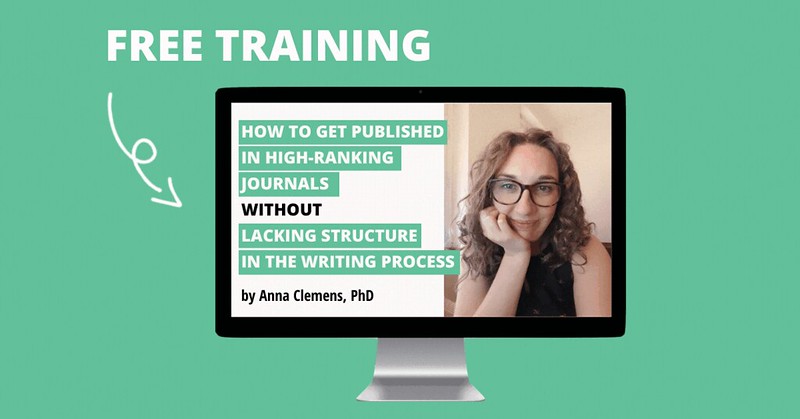
Share article
© Copyright 2018-2024 by Anna Clemens. All Rights Reserved.
Photography by Alice Dix

The best AI tools for research papers and academic research (Literature review, grants, PDFs and more)
As our collective understanding and application of artificial intelligence (AI) continues to evolve, so too does the realm of academic research. Some people are scared by it while others are openly embracing the change.
Make no mistake, AI is here to stay!
Instead of tirelessly scrolling through hundreds of PDFs, a powerful AI tool comes to your rescue, summarizing key information in your research papers. Instead of manually combing through citations and conducting literature reviews, an AI research assistant proficiently handles these tasks.
These aren’t futuristic dreams, but today’s reality. Welcome to the transformative world of AI-powered research tools!
This blog post will dive deeper into these tools, providing a detailed review of how AI is revolutionizing academic research. We’ll look at the tools that can make your literature review process less tedious, your search for relevant papers more precise, and your overall research process more efficient and fruitful.
I know that I wish these were around during my time in academia. It can be quite confronting when trying to work out what ones you should and shouldn’t use. A new one seems to be coming out every day!
Here is everything you need to know about AI for academic research and the ones I have personally trialed on my YouTube channel.
My Top AI Tools for Researchers and Academics – Tested and Reviewed!
There are many different tools now available on the market but there are only a handful that are specifically designed with researchers and academics as their primary user.
These are my recommendations that’ll cover almost everything that you’ll want to do:
| Find literature using semantic search. I use this almost every day to answer a question that pops into my head. | |
| An increasingly powerful and useful application, especially effective for conducting literature reviews through its advanced semantic search capabilities. | |
| An AI-powered search engine specifically designed for academic research, providing a range of innovative features that make it extremely valuable for academia, PhD candidates, and anyone interested in in-depth research on various topics. | |
| A tool designed to streamline the process of academic writing and journal submission, offering features that integrate directly with Microsoft Word as well as an online web document option. | |
| A tools that allow users to easily understand complex language in peer reviewed papers. The free tier is enough for nearly everyone. | |
| A versatile and powerful tool that acts like a personal data scientist, ideal for any research field. It simplifies data analysis and visualization, making complex tasks approachable and quick through its user-friendly interface. |
Want to find out all of the tools that you could use?
Here they are, below:
AI literature search and mapping – best AI tools for a literature review – elicit and more
Harnessing AI tools for literature reviews and mapping brings a new level of efficiency and precision to academic research. No longer do you have to spend hours looking in obscure research databases to find what you need!
AI-powered tools like Semantic Scholar and elicit.org use sophisticated search engines to quickly identify relevant papers.
They can mine key information from countless PDFs, drastically reducing research time. You can even search with semantic questions, rather than having to deal with key words etc.
With AI as your research assistant, you can navigate the vast sea of scientific research with ease, uncovering citations and focusing on academic writing. It’s a revolutionary way to take on literature reviews.
- Elicit – https://elicit.org
- Litmaps – https://www.litmaps.com
- Research rabbit – https://www.researchrabbit.ai/
- Connected Papers – https://www.connectedpapers.com/
- Supersymmetry.ai: https://www.supersymmetry.ai
- Semantic Scholar: https://www.semanticscholar.org
- Laser AI – https://laser.ai/
- Inciteful – https://inciteful.xyz/
- Scite – https://scite.ai/
- System – https://www.system.com
If you like AI tools you may want to check out this article:
- How to get ChatGPT to write an essay [The prompts you need]
AI-powered research tools and AI for academic research
AI research tools, like Concensus, offer immense benefits in scientific research. Here are the general AI-powered tools for academic research.
These AI-powered tools can efficiently summarize PDFs, extract key information, and perform AI-powered searches, and much more. Some are even working towards adding your own data base of files to ask questions from.
Tools like scite even analyze citations in depth, while AI models like ChatGPT elicit new perspectives.
The result? The research process, previously a grueling endeavor, becomes significantly streamlined, offering you time for deeper exploration and understanding. Say goodbye to traditional struggles, and hello to your new AI research assistant!
- Consensus – https://consensus.app/
- Iris AI – https://iris.ai/
- Research Buddy – https://researchbuddy.app/
- Mirror Think – https://mirrorthink.ai
AI for reading peer-reviewed papers easily
Using AI tools like Explain paper and Humata can significantly enhance your engagement with peer-reviewed papers. I always used to skip over the details of the papers because I had reached saturation point with the information coming in.
These AI-powered research tools provide succinct summaries, saving you from sifting through extensive PDFs – no more boring nights trying to figure out which papers are the most important ones for you to read!
They not only facilitate efficient literature reviews by presenting key information, but also find overlooked insights.
With AI, deciphering complex citations and accelerating research has never been easier.
- Aetherbrain – https://aetherbrain.ai
- Explain Paper – https://www.explainpaper.com
- Chat PDF – https://www.chatpdf.com
- Humata – https://www.humata.ai/
- Lateral AI – https://www.lateral.io/
- Paper Brain – https://www.paperbrain.study/
- Scholarcy – https://www.scholarcy.com/
- SciSpace Copilot – https://typeset.io/
- Unriddle – https://www.unriddle.ai/
- Sharly.ai – https://www.sharly.ai/
- Open Read – https://www.openread.academy
AI for scientific writing and research papers
In the ever-evolving realm of academic research, AI tools are increasingly taking center stage.
Enter Paper Wizard, Jenny.AI, and Wisio – these groundbreaking platforms are set to revolutionize the way we approach scientific writing.
Together, these AI tools are pioneering a new era of efficient, streamlined scientific writing.
- Jenny.AI – https://jenni.ai/ (20% off with code ANDY20)
- Yomu – https://www.yomu.ai
- Wisio – https://www.wisio.app
AI academic editing tools
In the realm of scientific writing and editing, artificial intelligence (AI) tools are making a world of difference, offering precision and efficiency like never before. Consider tools such as Paper Pal, Writefull, and Trinka.
Together, these tools usher in a new era of scientific writing, where AI is your dedicated partner in the quest for impeccable composition.
- PaperPal – https://paperpal.com/
- Writefull – https://www.writefull.com/
- Trinka – https://www.trinka.ai/
AI tools for grant writing
In the challenging realm of science grant writing, two innovative AI tools are making waves: Granted AI and Grantable.
These platforms are game-changers, leveraging the power of artificial intelligence to streamline and enhance the grant application process.
Granted AI, an intelligent tool, uses AI algorithms to simplify the process of finding, applying, and managing grants. Meanwhile, Grantable offers a platform that automates and organizes grant application processes, making it easier than ever to secure funding.
Together, these tools are transforming the way we approach grant writing, using the power of AI to turn a complex, often arduous task into a more manageable, efficient, and successful endeavor.
- Granted AI – https://grantedai.com/
- Grantable – https://grantable.co/
Best free AI research tools
There are many different tools online that are emerging for researchers to be able to streamline their research processes. There’s no need for convience to come at a massive cost and break the bank.
The best free ones at time of writing are:
- Elicit – https://elicit.org
- Connected Papers – https://www.connectedpapers.com/
- Litmaps – https://www.litmaps.com ( 10% off Pro subscription using the code “STAPLETON” )
- Consensus – https://consensus.app/
Wrapping up
The integration of artificial intelligence in the world of academic research is nothing short of revolutionary.
With the array of AI tools we’ve explored today – from research and mapping, literature review, peer-reviewed papers reading, scientific writing, to academic editing and grant writing – the landscape of research is significantly transformed.
The advantages that AI-powered research tools bring to the table – efficiency, precision, time saving, and a more streamlined process – cannot be overstated.
These AI research tools aren’t just about convenience; they are transforming the way we conduct and comprehend research.
They liberate researchers from the clutches of tedium and overwhelm, allowing for more space for deep exploration, innovative thinking, and in-depth comprehension.
Whether you’re an experienced academic researcher or a student just starting out, these tools provide indispensable aid in your research journey.
And with a suite of free AI tools also available, there is no reason to not explore and embrace this AI revolution in academic research.
We are on the precipice of a new era of academic research, one where AI and human ingenuity work in tandem for richer, more profound scientific exploration. The future of research is here, and it is smart, efficient, and AI-powered.
Before we get too excited however, let us remember that AI tools are meant to be our assistants, not our masters. As we engage with these advanced technologies, let’s not lose sight of the human intellect, intuition, and imagination that form the heart of all meaningful research. Happy researching!
Thank you to Ivan Aguilar – Ph.D. Student at SFU (Simon Fraser University), for starting this list for me!

Dr Andrew Stapleton has a Masters and PhD in Chemistry from the UK and Australia. He has many years of research experience and has worked as a Postdoctoral Fellow and Associate at a number of Universities. Although having secured funding for his own research, he left academia to help others with his YouTube channel all about the inner workings of academia and how to make it work for you.
Thank you for visiting Academia Insider.
We are here to help you navigate Academia as painlessly as possible. We are supported by our readers and by visiting you are helping us earn a small amount through ads and affiliate revenue - Thank you!

2024 © Academia Insider

The 11 best AI tools for academic writing
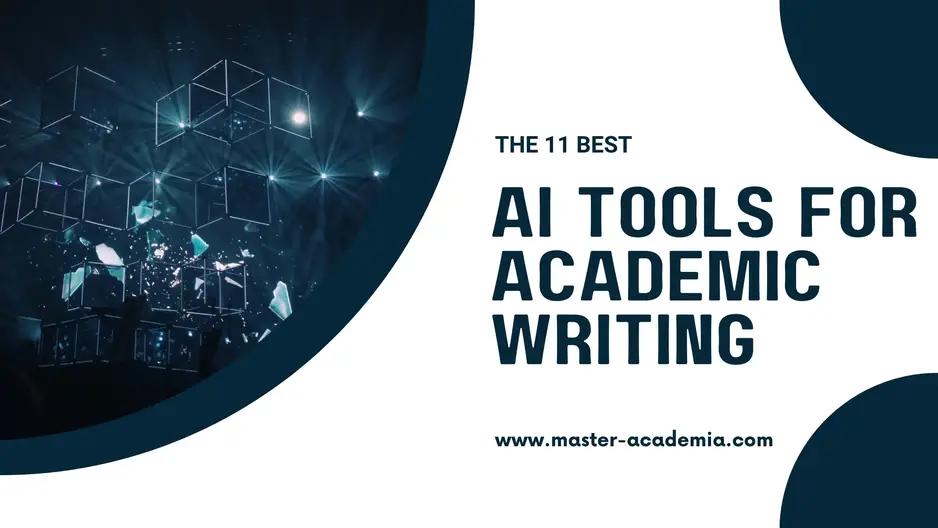
By leveraging the power of the right AI tool, you can significantly improve the clarity, efficiency, and overall quality of your academic writing. In this guide, we reviewed and ranked 11 popular AI tools for academic writing , along with our top 3 choices, so that you can pick the best one.
What are the best AI tools for academic writing?
With the rise of AI tools, academic writing is undergoing a remarkable transformation. The emergence of new AI-powered tools has revolutionized the way researchers, scholars, and students approach their writing tasks.
Having to use multiple tools for different purposes can be frustrating. Therefore, comprehensive testing was conducted on AI tools to assess their all-encompassing capabilities.
Furthermore, the optional functions were compared to their respective prices to ensure a fair pricing structure. AI support for academic writing should be affordable and not strain your budget.
Here are Master Academia’s top picks for the best AI tools for academic writing in 2023:
Trinka is a unique AI-powered writing tool designed specifically for academic and technical writing.
Trinka takes into account the specific research subjects, ensuring that the writing style, word choice, and tone align with disciplinary standards and scientific conventions.
Key Features:
You can use the basic version of Trinka for free, which includes access to all features but with a monthly word limit of 5000 words. The pricing for Trinka’s premium plan starts at $6.67 per month with annual billing, which is extremely affordable.
Genei streamlines the academic writing process by utilizing AI-generated summaries and note-taking shortcuts, extracting information from academic articles.
For those heavily reliant on literature reviews in their academic writing, Genei proves to be a gamechanger.
3. Quil lBot
With QuillBot ‘s all-in-one Co-Writer, you can access paraphrasing, summarizing, citation creation, and essay writing tools in a single location.
In simple terms, QuillBot’s AI will collaborate with you to generate effective rephrasing. You have a lot of control as you can compare outputs from all seven available modes to choose the most suitable paraphrase.
With the premium plan, you gain access to full functionality, including unlimited word paraphrasing, summarizing up to 6000 words, faster processing, advanced grammar features, tone detection, and more. The premium plan is priced at $19.95 per month or $8.33 per month when paid annually.
4. Writefull
With additional AI widgets like the Abstract Generator, Academizer, Paraphraser, and Title Generator, it provides inspiration and assistance for academic writers.
Writefull can be used with limited functionality for free. Its Premium Plan offers unlimited use of all features at a cost of $15.37 per month.
5. Grammarly
Grammarly stands out among other AI tools by having a widespread and popular institutional license, which universities readily embrace.
Grammarly’s popularity in the academic community can be attributed to its support for citation style formatting and robust plagiarism detection, making it a valuable tool for academic writing.
The business account may not be of interest to students or researchers. However, universities can opt for Grammarly for Education, which provides licenses for free premium plans to students and staff.
6. Wordtune
The tool itself proclaims that it has gained the trust of students and researchers at renowned universities.
7. Paperpal
Paperpal, developed by Researcher.life, is a specialized AI tool designed for researchers and academic writers, leveraging the expertise gained from editing numerous manuscripts by professional editors.
Available as Paperpal for Word, Web, and Manuscript, this comprehensive tool also checks for structural and technical inconsistencies in your writing.
8. Sourcely
By analyzing text and identifying key themes, Sourcely searches through a vast data set to locate relevant and reliable sources, providing academic writers with the information needed to support their work.
Sourcely offers great affordability with a price of $5.99 per month or $36.99 per year. While it may have fewer features compared to other academic writing tools, its lower price point still makes it a valuable and useful tool for academic writing.
Rytr is a text-generating AI tool. Depending on the purpose, academics can find it useful for selecting from multiple languages and tones of voice, as well as rewording and shortening text.
Alternatively, the Unlimited plan is available at $29 per month or $290 per year. These different pricing tiers cater to the diverse needs of users, ensuring they can find the plan that best suits their requirements.
10. Writesonic
Upon generating a paragraph, Writesonic provides three different versions for you to choose from. It allows you to select the best option or make edits and revisions using the various variations.
11. TextCortex
TextCortex is an AI tool which can condense long texts into concise summaries, capturing the essential points.
Summary and Top Picks
The landscape of AI writing tools is continuously evolving, witnessing the introduction of new tools regularly. However, not all these tools are equally suitable for academic writing, as their effectiveness depends on your specific goals and requirements.
Master Academia
Get new content delivered directly to your inbox, how to benefit from chatgpt as an academic, 38 common academic job interview questions (+ powerful answers), related articles, how to write a good research proposal (in 9 steps), theoretical vs. conceptual frameworks: simple definitions and an overview of key differences, the best ai tools for academic paraphrasing: tested and ranked, 25 short graduation quotes: inspiration in four words or less.
Training videos | Faqs

What People are Saying
Last year more than a million students, academics and post docs downloaded Ref-n-write and published more than 5000 research papers. Click on the buttons to see the reviews.

Sign up for a free trial and test out the referencing, paraphrasing and phrasebank tools.
Training videos
Go through the training videos and understand how to use the various features of the tool.
Knowledge Hub
Read our blog articles. We cover a wide range of topics related to academic writing.
If you have questions, visit our frequently asked questions page. Also, please feel free to drop us an email.
Follow us on social media, we post information about our promotions, software updates and other useful stuff there.
- 0.7K Share Facebook
- 0.3K Share Twitter
- 0.3K Share LinkedIn
- 0.5K Share Email
Your Writing Assistant for Research
Unlock Your Research Potential with Jenni AI
Are you an academic researcher seeking assistance in your quest to create remarkable research and scientific papers? Jenni AI is here to empower you, not by doing the work for you, but by enhancing your research process and efficiency. Explore how Jenni AI can elevate your academic writing experience and accelerate your journey toward academic excellence.

Loved by over 3 million academics

Academia's Trusted Companion
Join our academic community and elevate your research journey alongside fellow scholars with Jenni AI.

Effortlessly Ignite Your Research Ideas
Unlock your potential with these standout features
Boost Productivity
Save time and effort with AI assistance, allowing you to focus on critical aspects of your research. Craft well-structured, scholarly papers with ease, backed by AI-driven recommendations and real-time feedback.
Get started

Overcome Writer's Block
Get inspiration and generate ideas to break through the barriers of writer's block. Jenni AI generates research prompts tailored to your subject, sparking your creativity and guiding your research.
Unlock Your Full Writing Potential
Jenni AI is designed to boost your academic writing capabilities, not as a shortcut, but as a tool to help you overcome writer's block and enhance your research papers' quality.

Ensure Accuracy
Properly format citations and references, ensuring your work meets academic standards. Jenni AI offers accurate and hassle-free citation assistance, including APA, MLA, and Chicago styles.
Our Commitment: Academic Honesty
Jenni AI is committed to upholding academic integrity. Our tool is designed to assist, not replace, your effort in research and writing. We strongly discourage any unethical use. We're dedicated to helping you excel in a responsible and ethical manner.
How it Works
Sign up for free.
To get started, sign up for a free account on Jenni AI's platform.
Prompt Generation
Input your research topic, and Jenni AI generates comprehensive prompts to kickstart your paper.
Research Assistance
Find credible sources, articles, and relevant data with ease through our powerful AI-driven research assistant.
Writing Support
Draft and refine your paper with real-time suggestions for structure, content, and clarity.
Citation & References
Let Jenni AI handle your citations and references in multiple styles, saving you valuable time.
What Our Users Say
Discover how Jenni AI has made a difference in the lives of academics just like you

I thought AI writing was useless. Then I found Jenni AI, the AI-powered assistant for academic writing. It turned out to be much more advanced than I ever could have imagined. Jenni AI = ChatGPT x 10.

Charlie Cuddy
@sonofgorkhali
Love this use of AI to assist with, not replace, writing! Keep crushing it @Davidjpark96 💪

Waqar Younas, PhD
@waqaryofficial
4/9 Jenni AI's Outline Builder is a game-changer for organizing your thoughts and structuring your content. Create detailed outlines effortlessly, ensuring your writing is clear and coherent. #OutlineBuilder #WritingTools #JenniAI

I started with Jenni-who & Jenni-what. But now I can't write without Jenni. I love Jenni AI and am amazed to see how far Jenni has come. Kudos to http://Jenni.AI team.

Jenni is perfect for writing research docs, SOPs, study projects presentations 👌🏽

Stéphane Prud'homme
http://jenni.ai is awesome and super useful! thanks to @Davidjpark96 and @whoisjenniai fyi @Phd_jeu @DoctoralStories @WriteThatPhD
Frequently asked questions
How much does jenni ai cost, how can jenni ai assist me in writing complex academic papers, can jenni ai handle different types of academic papers, such as essays, research papers, and dissertationss jenni ai maintain the originality of my work, how does artificial intelligence enhance my academic writing with jenni ai.
Can Jenni AI help me structure and write a comprehensive literature review?
Will using Jenni AI improve my overall writing skills?
Can Jenni AI assist with crafting a thesis statement?
What sets Jenni AI apart as an AI-powered writing tool?
Can I trust Jenni AI to help me maintain academic integrity in my work?
Choosing the Right Academic Writing Companion
Get ready to make an informed decision and uncover the key reasons why Jenni AI is your ultimate tool for academic excellence.
Feature Featire
COMPETITORS
Enhanced Writing Style
Jenni AI excels in refining your writing style and enhancing sentence structure to meet academic standards with precision.
Competitors may offer basic grammar checking but often fall short in fine-tuning the nuances of writing style.
Academic Writing Process
Jenni AI streamlines the academic writing process, offering real-time assistance in content generation and thorough proofreading.
Competitors may not provide the same level of support, leaving users to navigate the intricacies of academic writing on their own.
Scientific Writing
Jenni AI is tailored for scientific writing, ensuring the clarity and precision needed in research articles and reports.
Competitors may offer generic writing tools that lack the specialized features required for scientific writing.
Original Content and Academic Integrity
Jenni AI's AI algorithms focus on producing original content while preventing plagiarism, ensuring academic integrity.
Competitors may not provide robust plagiarism checks, potentially compromising academic integrity.
Valuable Tool for Technical Writing
Jenni AI extends its versatility to technical writing, aiding in the creation of clear and concise technical documents.
Some competitors may not be as well-suited for technical writing projects.
User-Friendly Interface
Jenni AI offers an intuitive and user-friendly interface, making it easy for both novice and experienced writers to utilize its features effectively.
Some competitors may have steeper learning curves or complex interfaces, which can be time-consuming and frustrating for users.
Seamless Citation Management
Jenni AI simplifies the citation management process, offering suggestions and templates for various citation styles.
Competitors may not provide the same level of support for correct and consistent citations.
Ready to Revolutionize Your Research Writing?
Sign up for a free Jenni AI account today. Unlock your research potential and experience the difference for yourself. Your journey to academic excellence starts here.
- Translators
- Graphic Designers
Please enter the email address you used for your account. Your sign in information will be sent to your email address after it has been verified.
Top 20 Online Tools for Academic Writing

The strict guidelines and high expectations associated with academic writing tend to intimidate even the most confident writers, so I've compiled this list of the top 20 online tools for academic writing. If you utilize the tools available through these 20 websites, you can approach academic writing with confidence.
- The Purdue Online Writing Lab features detailed guidelines and explanations to help you adhere to each particular style guide (such as AP , APA , MLA , and Chicago ). If you need to cite sources in your academic writing, the Purdue Owl is an essential online academic tool. The Purdue Owl is thorough and organized, so you can find information and answer specific format questions quickly. The site even includes sample papers of each citation style so you can see formatting examples and how the citation guidelines apply to an actual paper.
- The University of North Carolina Writing Center is a comprehensive online writing resource that is available whether you attend UNC or not. UNC's Writing Center offers tutorials and tips that will answer all of your academic writing questions.
- Trello is a site that makes it easier to work with co-authors and collaborate as a team. You can create custom boards, assign tasks, and manage information on the easy-to-use visual platform.
- The Hemingway App uses artificial intelligence to analyze your text for run-on or complicated sentences, passive voice, and other habits that weaken your writing. The Hemingway App uses a color-coded system to highlight different issues and provides suggestions for how to reword the sentence.
- Cardscanner.co offers a dedicated OCR-based Image to text converter tool that allows you to extract text from images and documents with high accuracy and ease. This tool is particularly useful for academic writers who need to convert scanned articles, research papers, or handwritten notes into editable text quickly and efficiently.
- Marinara Time is perfect for anyone who struggles to stay on task. The Marinara Timer provides a customizable adaptation of the Pomodoro technique so you can choose work intervals and break times that work best for your schedule. If time management doesn't come naturally to you, the Marinara Timer is here to help.
- Readable is a free online tool that uses artificial intelligence to score the "readability" of your content. The site will also evaluate other aspects of your writing such as your average number of words per sentence and syllables per word, and it will assign you a Flesch-Kincaid Grade Level to identify your text's approximate grade level. You can just copy and paste your text onto their documents page, and it will generate a readability score for you. They only give you one free readability assessment, so use it wisely if you don't have the money to pay for their subscription service.
- Omni Calculator is ideal for academic writers who need a little external assistance with document planning and pacing. The Omni Calculator prompts you to enter your total word count and project's due date, and then it tells you how many words you need to write per day to stay on track. It calculates your average words per minute, keeps track of how much time you've spent writing, and estimates how long it will take you to finish the project. As long as you remember to use it, the Omni calculator is a useful tool for those of us who struggle with time management.
- Paper Panda is a free browser extension that gives you access to previous studies and academic papers that otherwise might be inaccessible. If you keep encountering paywalls that prevent you from reading relevant studies that you want to cite, check out Panda Paper.
- The Nuts & Bolts of College Writing is full of useful tips that are particularly tailored for academic writers. If you are looking for advice regarding clear and effective writing, look no further.
- OneLook is an online thesaurus that suggests alternate words when you just can't think of the exact word you want to use or you've used the word "evaluated" too many times and you're desperate for a good synonym. OneLook even lets you choose the part of speech that you're looking for so you can narrow your results.
- Phrase Bank is an online databank of phrases that are commonly used in academic papers and scientific journals. If you keep typing the phrase "for example," in your paper, visit Phrase Bank's Giving Examples page to find out what phrases other academic writers used. Phrase Bank offers suggestions for restating just about every part of a standard academic paper.
- Grammark is an online tool created by Mark Fullmer that will evaluate your writing for passive sentences, academic style, nominalizations, sentence variety, wordiness, transitions, and a few other issues. However, Grammark clearly states that it does not check for fragments/incomplete sentences, comma splices, tense shifts, subject-verb agreement, apostrophe errors, or idiotic ideas, so it should not be the only tool that you use to check for grammar and punctuation errors.
- Google Docs is a great online resource for collaborating with co-authors, and it also saves your work to the cloud so you won't have to worry about losing all of your hard work.
- Cambridge Rindge and Latin School Outline Maker provides an easy-to-use outline format to help you plan your academic paper and conceptualize your thesis. To generate your personalized outline, fill in the basic text boxes on this simple website and input your title, thesis statement, and your main points along with your supporting evidence for each point.
- Mendeley is a free reference manager that enables you to store all of your sources in one searchable place. Mendeley is available as a website add-on or as a downloadable reference manager to help you keep track of your sources as you write. The platform also provides space for you to record your thoughts, notes, and comments on the material.
- EasyBib will help you generate in-text citations and a references list. The citation generator will adhere to your specified format, but it will not recognize typos or misspellings if you type the information incorrectly, so it is essential that you review the citations to ensure that they are correct. Every time that I've worked with a client who used an online citation generator, I have found errors in the citations, so check yours carefully.
- Zotero is another free online citation generator that will help you organize your sources and cite them according to your specific citation style. As with any citation generator, make sure you proofread each citation and ensure that you've spelled names correctly and entered accurate years and page numbers.
- Otter.ai is an online recording and transcription tool that will transcribe scientific interviews, meetings, or focus groups so you don't have to. Otter's live recording and transcription services will make it easy to get accurate participant quotes and statements.
- XMind mind mapping tool is ideal for visual thinkers who organize their thoughts best with a mind map or visual web.
- Insights blog
8 useful research paper writing tools and resources
Academic writing can be a daunting and time-consuming process, but with the help of the right tools you can make writing your paper much easier.
In this post, we have pulled together 8 tools and resources that will help you work better and smarter when writing a research paper.

Our downloadable comprehensive free guide: Writing your paper
Todoist: A to-do list to organize your work
Evernote: As a research notebook
Grammarly: Cloud based typing assistant
Ref-n-Write: Look up and learn while writing your paper
Hemingway Editor: Refine your work to be bold and clear
Our downloadable article and journal templates
Our 10-point checklist to guide your writing process
Writing your paper: a comprehensive free guide
If you’re ready to start writing your paper, our Writing your paper free guide is a useful tool to help you through your various writing stages.
This resource will guide you through writing your paper from start to finish, including preparation and setting your structure, to writing every section of your paper and preparing it for submission.
Post information
Related posts, insights topics.
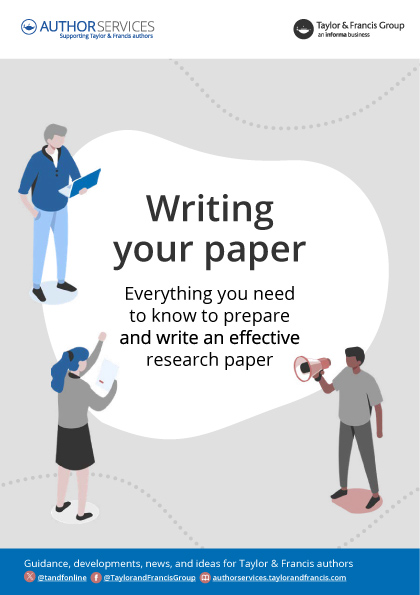
Read the guide to find out all you need to know about:
Article structures and formatting
Choosing keywords and writing for SEO
How to write your research manuscript
Refining your writing
Finalizing the details of your paper
Considering ethics
Download your free guide today for guidance on how to navigate the article writing process.
Todoist is a task management app that can help you stay organized during the writing process.
Writing an academic paper is not just about putting the words on paper. In fact, some researchers might argue the writing is one of the easier parts! Your tasks before you start writing are also critical to your writing success.
If you’ve read our Writing your paper free guide , you’ll know that it’s important to prepare before you start writing. You need to organize your thoughts, materials, and the steps you plan to take to prepare your article for submission . This is where Todoist comes in.
Todoist can be used for planning, scheduling, and building the outline for your personal, work, and academic tasks. Part of its appeal is its simple functionality and portability.
It can be used on your phone, tablet, and computer with great collaboration and integration capabilities. This could be like having your personal assistant with you at all times.
Todoist is free to use, but for higher project limits or additional features like reminders, you can decide if you need an upgraded paid version.
An example of a simple outline:
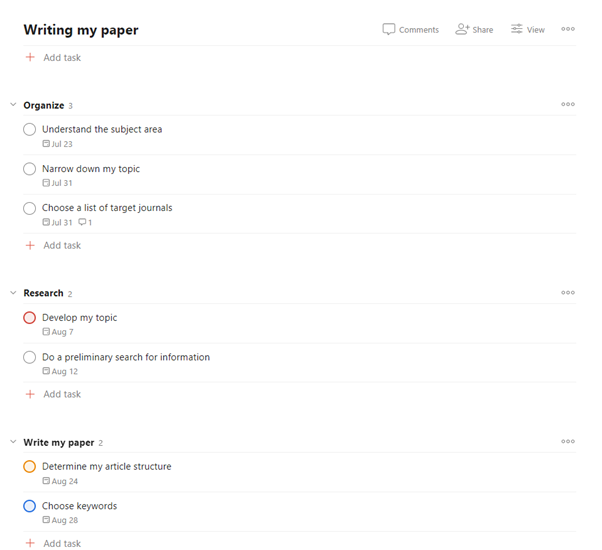
If you’re looking for a productive way to take notes and sort through your research materials, Evernote can be a useful tool to consider.
You can organize your research by creating a notebook structure to keep similar notes together. You can also make your notes more useful by adding texts, images, and documents.
Another useful feature is capturing audio notes with the inbuilt recorder. It’s easy to share and discuss your notes and notebooks, without having to leave the Evernote app.
Keep in mind you can also seamlessly create Todoist tasks from Evernote notes, and vice versa to double your productivity.
The basic version of Evernote is free and lets you create unlimited notes but with a limitation of storage space to 60MB a month. For more storage you will require to upgrade to a paid subscription plan.
Here’s what it might look like to get started:
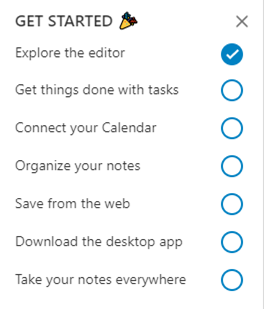
Grammarly is a typing assistant that uses artificial intelligence to identify any errors in spelling, grammar, and punctuation, then suggests an appropriate replacement.
When you install it on your laptop or computer, it will flag any errors in your text and provide you with an alternative, or even prompt you to remove particular phrases.
Keep in mind that your paper might contain technical terms or phrases that Grammarly may not understand, which could be flagged as errors. So, make sure you look over the prompts from Grammarly before accepting changes.
The basic function of Grammarly is free, which helps identify most spelling and grammar errors, but for a more robust check on everything you write, a paid upgraded premium version is available.
Also, you could consider using a professional academic editor , who will make sure your manuscript meets scholarly English standards.
Ref-n-Write
High-quality research deserves proper academic writing. Ref-n-Write is a tool with an impressive library of phrases used in academic writing. Using artificial intelligence technology, the tool provides details on choosing the right academic phrase, cross-referencing previous work, suggesting new ideas, and more.
Non-native English speakers may find this tool helpful to paraphrase their text and improve their English writing skills through practice. To test out the referencing, paraphrasing and phrase bank tools, you can sign up for a free trial.
Don’t allow language be an issue in getting your research published. Please read this guide for more information on how to break language barriers and publish in international journals .
Hemingway Editor
Hemingway Editor is an editing tool that can help you refine your writing, pinpointing areas of your work that will affect readability. Clear writing is important to communicate your research effectively to readers.
This tool also guides you on how to improve the sentences in your document. It highlights sentences that are hard to read, words or phrases with simpler alternatives, passive voices, as well as the number of adverbs present in your work.
Hemingway App has a free version but it also has a paid version with additional features for publishing, formatting and more .
For confidence about the quality of your paper, also consider the extra step of using experts in subject-relevant editing . They will make sure your work is free of grammatical, spelling, and other common language errors.
Article and journal templates
To save you time, our downloadable article and journal templates are a useful resource for formatting your manuscript. Our template will help you format your work correctly for submission, and make sure you have the information the target journal expects to see.
Make sure you download the relevant template and apply it to your research paper, following the instructions provided.
Remember to follow the instructions regarding your specific research article’s format. Here’s a guide on the variety of different types of research articles .
You can also focus on your research and save valuable time by letting experts in academic formatting look after the format of your manuscript.
Writing your paper checklist
This checklist is a useful resource to help you quickly review all you need to write an effective paper.
Whether you are writing a paper for an assignment or to submit to a journal, this list contains important information on what makes a good research paper .
Follow the steps in our 10-point checklist, to help guide how you plan and organize your research to write an impactful paper.

Download the writing your paper free guide
Get a head start in your paper writing with this free guide.
You will have a blueprint to help you produce an impactful research paper.
English Language Editing
Improve your written English with editing from subject-matter experts.
Academic Translation with Editing
Translate your research to reach a wider community.
Article Formatting
Get your reference, citation and layout formatting checked by experts.
Where to next?
If you’ve found these tips helpful make sure you look at:
Writing your paper free guide – download this free guide to help you through your various writing stages.
Our Insights newsletter – the latest news, tips, and resources delivered straight to your inbox.
Share this post on social
- Skip to main content
- Skip to primary sidebar
- Skip to footer
- QuestionPro

- Solutions Industries Gaming Automotive Sports and events Education Government Travel & Hospitality Financial Services Healthcare Cannabis Technology Use Case AskWhy Communities Audience Contactless surveys Mobile LivePolls Member Experience GDPR Positive People Science 360 Feedback Surveys
- Resources Blog eBooks Survey Templates Case Studies Training Help center
Home Surveys Academic Research
Academic Research Tools: What they are + Top 5 Best
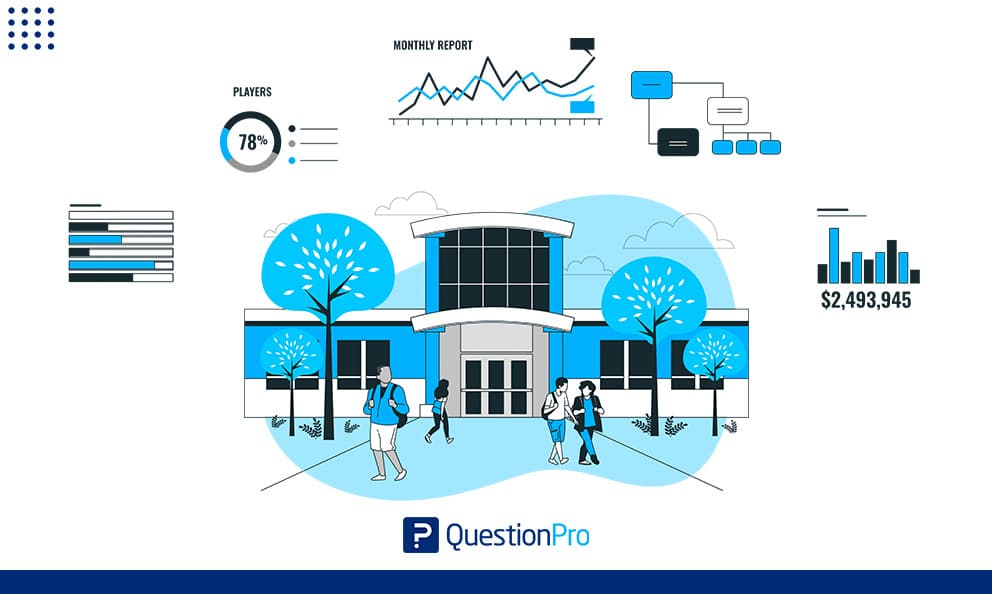
Academic research is a rigorous activity that requires a lot of dedication and diligence to provide great-quality results. Technology has improved how we access information by making access to information faster and more effective, so we carry out research more efficiently.
When conducting research, you must have the best methods and tools to facilitate the process. Every researcher needs a typing assistant to review spelling, grammar, and punctuation mistakes. If your research involves data analysis, you need a statistical research tool. You’ll probably need a virtual library for consulting if it involves psychology or sociology.
What are academic research tools?
An academic research tool is a software or platform that helps researchers organize, analyze, and manage the various components of their research projects. Some examples of academic research tools include reference management software, data visualization software, and survey design tools. These tools are designed to support the various stages of the research process, from literature review and data collection to data analysis and publication.
Reference management software, such as Mendeley or Endnote, allows researchers to organize and manage their bibliographic references and citations. This can be particularly helpful for large literature reviews, as it allows researchers to easily search and access their reference library and format citations and bibliographies in various styles. Additionally, many reference management tools offer features like annotation and collaboration, so researchers can share their reference libraries with colleagues and work on them together.
Data visualization software, like Tableau or R, can help researchers to explore and understand their data. These tools allow researchers to create interactive visualizations from their data, such as charts, graphs, and maps. This can be very useful for identifying patterns and trends that might not be immediately apparent from looking at raw data. These tools also provide a way to communicate the findings from their research clearly and effectively, as visualizations can be more easily understood than raw data.
Data collection software is another important tool that can support the research process. This software can be used to design and administer surveys, collect and store data, and manage participant information. Top data collection software such as QuestionPro offers a variety of question types, such as multiple choice, rating scales, and open-ended questions. They can be used to conduct surveys online or in person. This software also provides features like skip logic, data validation, and data export, which can help to ensure data quality and facilitate analysis. Some data collection software also integrates with data visualization or statistical software, making it easy to analyze and visualize once data is collected.
Top 5 Academic Research Tools
There are endless tools for academic research that can help you in any stage of the research process, from educational search engine software and project management tools to grammar editors and reference managers. Adopting these technologies can improve the quality of academic research, regardless of the field or topic.
From the multiple options in the market, we made a list of the best five academic research tools you can use to level up your academic research:
EndNote gives you the tools you need for searching, organizing, and sharing your research. It allows you to easily create bibliographies while writing your following paper with features like Cite While You Write. Maximize your time with features like finding full text for your references and automatically updating records.
Whether you’re on your desktop, online, or iPad, EndNote’s syncing capabilities let you access all of your references, attachments, and groups from anywhere.
Bit AI is an excellent tool for collaborating on research with your team. It’s essentially like a Google Docs but specifically made for research. You can upload and share different file formats, including PDFs, videos, white papers, etc., and then edit them together with your team.
Typeset is a great tool when it comes to writing your own research papers. You can upload all your references for simple citations and check your work for spelling errors and plagiarism. Typeset also offers features to collaborate with your teammates and get the work done together.
2. Google Scholar
Google Scholar is a classic tool that only some people know about. It’s essentially a version of the traditional Google search but focused on scientific and academic papers, journals, books, and other publications. Instead of using Google, you can use Google Scholar to eliminate the risk of citing non-credible sources.
1. QuestionPro
Most academic research, regardless of field or topic, requires data analysis so the information can have a solid foundation. Online surveys are critical to examine population samples so hypotheses can be proved or disregarded. While methods and techniques may vary, QuestionPro survey software is an excellent academic research tool for conducting online surveys.
QuestionPro’s robust suite of research tools provides you with all you need to derive research results. If someone needs a simple survey tool or a collaborative research solution, this software offers solutions in an intuitive way. The platform is simple to use intuitively, but our certification process can assist you in creating powerful surveys that minimize the risks of information bias. If needed, in the platform, you can also perform Audience Surveys . Audience gives you access to millions of possible respondents so that your segmentation sample for academic research becomes 360°.
QuestionPro also provides easy-to-setup analytical research tools to build dashboards and visualizations for all your research results. Presenting the data collected comprehensively is a crucial factor in research, making it easier for anyone to consult and cite the information.
It’s crucial to decide on the tools for data collection because research is carried out in different ways and for various purposes. Data collection aims to capture quality evidence that allows analysis to formulate convincing and credible answers to the posed questions.
With QuestionPro Education Research Solutions, you gain access to the top survey software in the market. Conduct powerful surveys with a complete set of data analytics tools to gather valuable insights. Join our community of more than 5000+ universities and colleges across the globe that already use our platform to make research of impact.
MORE LIKE THIS
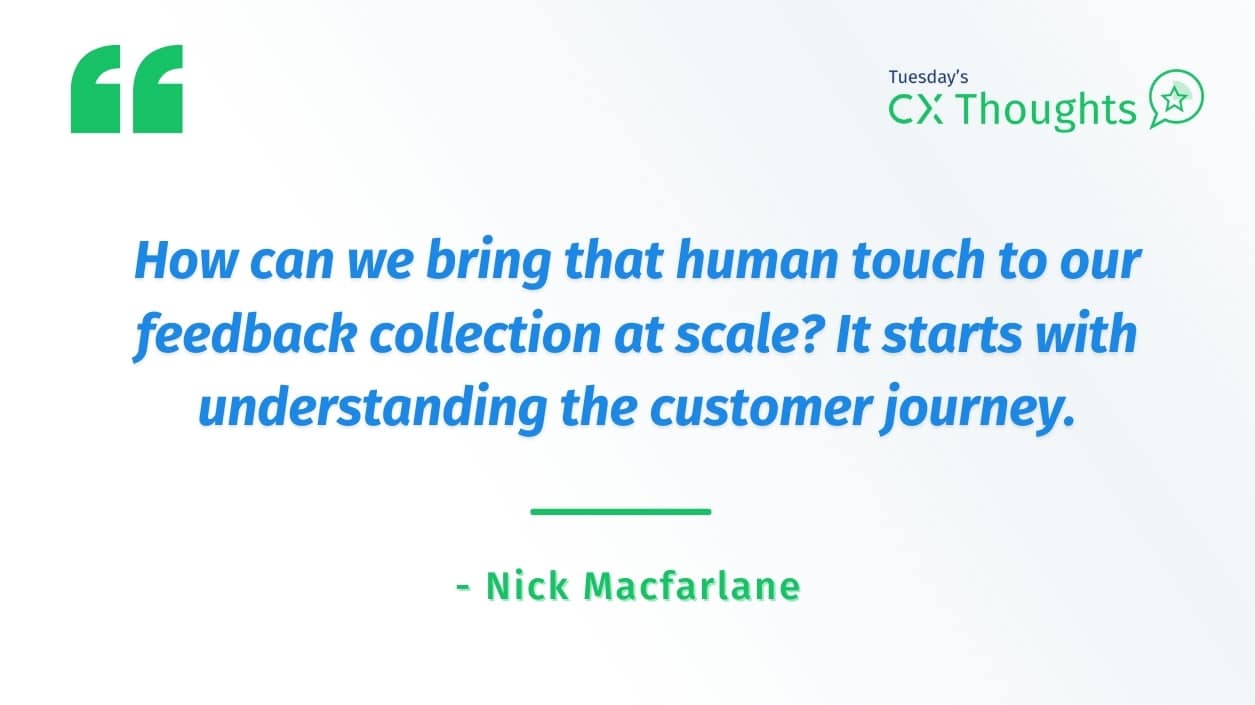
Are We Asking the Right Things at the Right Time in the Right Way? — Tuesday CX Thoughts
Aug 27, 2024
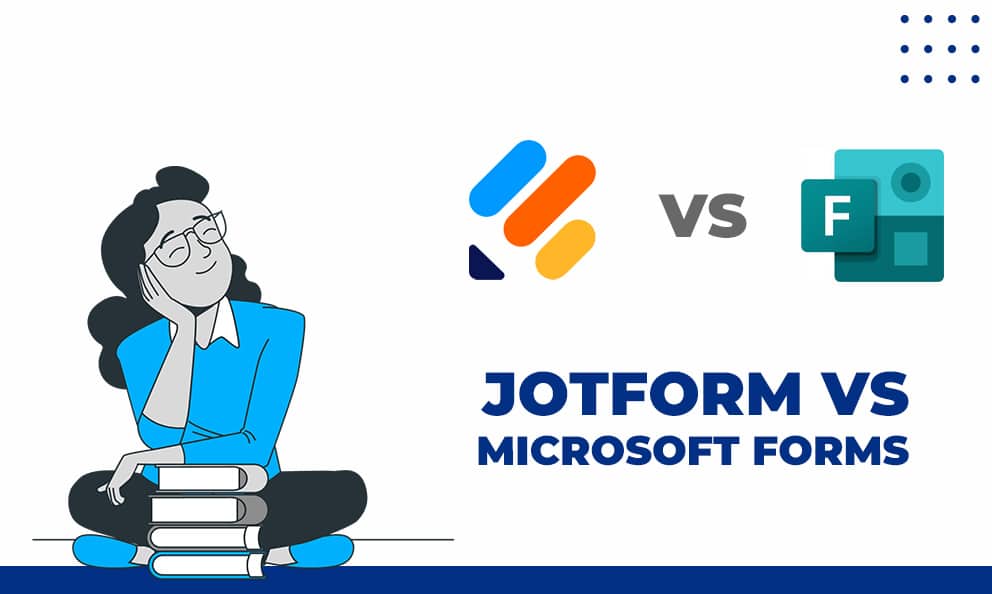
Jotform vs Microsoft Forms: Which Should You Choose?
Aug 26, 2024

Stay Conversations: What Is It, How to Use, Questions to Ask

Age Gating: Effective Strategies for Online Content Control
Aug 23, 2024
Other categories
- Academic Research
- Artificial Intelligence
- Assessments
- Brand Awareness
- Case Studies
- Communities
- Consumer Insights
- Customer effort score
- Customer Engagement
- Customer Experience
- Customer Loyalty
- Customer Research
- Customer Satisfaction
- Employee Benefits
- Employee Engagement
- Employee Retention
- Friday Five
- General Data Protection Regulation
- Insights Hub
- Life@QuestionPro
- Market Research
- Mobile diaries
- Mobile Surveys
- New Features
- Online Communities
- Question Types
- Questionnaire
- QuestionPro Products
- Release Notes
- Research Tools and Apps
- Revenue at Risk
- Survey Templates
- Training Tips
- Tuesday CX Thoughts (TCXT)
- Uncategorized
- What’s Coming Up
- Workforce Intelligence

Affiliate 💸
Get started free
Literature Review
15 Best Research Tools For Efficient Academic Research
Discover the 15 best research tools to streamline your academic work, helping you find credible sources and efficiently organize your findings.
Aug 26, 2024

Finding reliable sources is a crucial part of writing a research paper. But as any student can tell you, the process can be overwhelming. You may encounter a lot of articles that all look the same, not to mention the pressure to find the most relevant materials to meet your assignment's scope and requirements. Fortunately, this guide will help you whittle down the process. You’ll learn about valuable research tools to help you write efficient papers and get excellent study material with AI. One of the most influential research tools to help you narrow down your literature search is Otio's AI research and writing partner. This solution enables you to find and summarize academic sources relevant to your research topic so you can write your paper faster.
Table Of Contents
Why is research important, which tool is best for research, what are the tools used in research, benefits of using online research tools, supercharge your researching ability with otio — try otio for free today.

Research can help solve various health , engineering, and personal issues. For example, if you are experiencing a problem with your health, studies can help you understand what might be happening. If you’re looking for information online, you might find a reliable academic paper outlining your symptoms and suggesting possible solutions or treatments.
Research is Like a Workout for Your Brain
Research can be a complex process that challenges your thinking and imagination. It involves using your mental faculties to investigate an area of interest (like a theory) through logical processes such as inductive and deductive reasoning. It’s no wonder that research is often at the top of the list of activities that promote learning and cognitive development.
Research Expands Our Knowledge
Humans have always been curious. In astronomy, research has helped us learn more about our planet and the universe over time. Because of the vast nature of the universe’s components, constant research is fundamental for continuous knowledge. Another instance is climate change, where research is helping us understand it better and how to tackle it.
Research Creates Jobs
Research has played an essential role in creating jobs for a significant part of human history. Important breakthroughs in research often lead to the establishment of new industries and the creation of millions of jobs.
An example is the internet, which began as a research project and has since helped establish new sectors such as web design, programming, digital marketing, eCommerce, copywriting, and many others. Another good example is the aviation industry, which emerged after the efforts of pioneer aviators such as the Wright brothers.
Research Helps Gauge Public Opinion
Some forms of research , such as opinion polls, market research, and other surveys, gather helpful information. This information can help the researchers analyze and predict the population of interest (provided the sample is representative enough). Such predictions may only sometimes come to pass since human nature is dynamic rather than static.
Research Validates Existing Knowledge
The research breaks new ground and helps concretize, modify, or nullify existing knowledge. It is a good way of testing the real-life applicability of educational principles and theories. Such tests can modify existing theories or act as building blocks for new ones.

Discovering Otio: The Solution to Research Overload
Researchers today face overwhelming amounts of content. Otio is designed to help you cut through the noise. With its one AI-native workspace, Otio enables you to gather, understand, and create research materials in one place.
Collect: Gather Information From Multiple Sources
Otio helps you assemble research materials from numerous sources. You can collect bookmarks, tweets, PDFs, articles, videos, and more. Instead of spending hours organizing your research materials, let Otio help you gather data efficiently so you can move on to more critical tasks.
Extract: Key Takeaways Without the Busywork
Once you’ve collected information, Otio helps you make sense of it. The app uses AI to generate notes on your sources, summarizing critical takeaways for you. You can even chat with Otio about individual links or entire collections to extract relevant details for your project. This helps you quickly get up to speed with your research without reading every word.
Create: Draft Your Paper or Essay Faster
Otio doesn’t just help you collect and understand research . The app also enables you to write papers and essays faster. You can create first drafts using the notes and summaries from your research materials. Instead of starting from scratch, let Otio help you kickstart your writing process.
Related Reading
• Systematic Review Vs Meta Analysis • Impact Evaluation • How To Critique A Research Article • How To Synthesize Sources • Annotation Techniques • Skimming And Scanning • Types Of Literature Reviews • Literature Review Table • Literature Review Matrix • How To Increase Reading Speed And Comprehension • How To Read Research Papers • How To Summarize A Research Paper • Literature Gap

Data analysis tools , such as statistical software like SPSS, SAS, R, and Python, are crucial for making sense of collected data. Data visualization tools like Tableau, Power BI, and Excel can help researchers present their findings clearly and understandably.
Knowledge Management Tools Keep Researchers Organized
Knowledge management tools, including literature databases like PubMed, Scopus, and Web of Science, are essential for staying up-to-date with the latest research. Collaboration platforms like Google Drive, Microsoft Teams, and Slack facilitate teamwork and knowledge sharing among researchers.
Other Research Tools to Consider
Other valuable tools for researchers include reference management software, research management software, data mining tools, and ethical research tools.
Choosing the Right Research Tools for Your Study
The choice of research tools depends on the study's specific research objectives, methods, and requirements. By selecting appropriate tools, researchers can enhance the efficiency and effectiveness of their work.
• How To Do A Literature Search • How To Evaluate An Article • Literature Search Template • How To Identify Bias In A Source • Research Journal Example • How To Read A Research Paper Quickly • Meta-Analysis Methods • How to Summarize a Research Article • How To Take Notes For A Research Paper • How To Find Limitations Of A Study • ChatGPT Summarize Paper • ChatGPT Prompts For Research • Research Concept Map • Search Strategies For Research • How To Find Gaps In Research

1. Otio: Revolutionizing Research Workflows
Otio is designed to help researchers streamline their workflows and manage research materials and content overload. With Otio , you can collect data from many sources, including bookmarks, PDFs, articles, YouTube videos, tweets, and more. It helps you extract key takeaways with detailed AI-generated notes and source-grounded Q&A chat to help you understand what you read. Finally, Otio can help you organize your research and create draft outputs to help you write research papers and essays faster.
2. Bit AI: Collaborative Document Editing
Bit AI is an AI program designed to help teams collaborate on documents, wikis, and knowledge bases. It goes beyond just text and images, allowing users to create interactive documents containing videos, cloud files, and audio. It works much like Google Drive, allowing for real-time collaboration on documents. Multiple people can work on documents simultaneously and chat with one another within the interface.
Pros
Built-In AI Writing Assistant: AI Genius is the perfect tool for generating documents, wikis, and other information based on a text prompt
Multiple Use Cases: Bit AI is excellent for researchers and marketers, but also for product management, startups, and Human Resources due to its document development features
Collaboration Tools: Bit.ai allows multiple users to simultaneously collaborate on documents, notes, wikis, and other content in real-time
Wide Range of Integrations: Bit AI integrates with a large number of third-party tools, including YouTube, Google Sheets, Figma, GitHub, and more
Cons
Limited Customizations: Bit AI would be better if it had text formatting or options to customize the appearance of documents, such as matching company branding
3. Semantic Scholar: Smart Academic Literature Search
Semantic Scholar is one of the top AI tools for research , and it is widely used by students pursuing computer science, biomedical science, and neuroscience. It uses natural language processing to analyze academic papers and find relevant literature. Besides, Semantic Scholar offers detailed overviews of research topics and can identify the most critical parts of a paper, making it a valuable AI tool for research.
Refine search results for greater efficiency and relevance.
Continuously improves the tool based on user feedback and provides a personalized user experience.
The summary has accuracy issues and AI-generated citations.
It only gives you access to the full text of some papers.
4. Scite: Smart Citations for Academic Research
Scite is one of the most popular AI-powered academic research tools that improve academic research in one go. Its own natural language processing and machine learning help users do better research on scholarly articles and analyze citations.
Moreover, Scite allows researchers like you to assess the dependability of references in any particular context. It helps in evaluating the quality and impact of the research. It also provides better visualizations and metrics to understand the citation landscape of a specific paper or topic. If you have missed out on using this tool, try it today.
Innovative Citations: Scite analyzes how an article is referenced in other research. It can tell if the citing article supports, contradicts, or simply mentions the original article.
Citation Context: Scite shows you how different sections of an article are being cited in other research, which helps you to understand how the original research is being used and interpreted by other researchers
Citation Reports: Generates reports that show you citation patterns and trends, which helps users to identify articles and authors in a related field
Large Dataset: Scite was training on more than 187 million articles, books, preprints, and other datasets, making it a solid choice for researchers
Not All Articles Cited Are Accessible: Although Scite offers full-text access for most articles cited, some publishers have not.

6. Google Scholar: Search Engine for Academic Literature
Google Scholar is a beacon for academic research, offering a straightforward platform akin to its browser counterpart. It’s a treasure trove of recent articles, research papers, and scholarly literature, simplifying the quest for up-to-date information with easy-to-identify tags for quick access.
Use natural language searching to find academic and literature topics.
Allow your search for gray literature for systematic reviews.
The content you find will not be reviewed thoroughly, and there are concerns about source credibility.
You should have shown significant literature topics.
7. PDFGear Copilot: ChatGPT for PDF Research
PDFgear Copilot is an AI-powered assistant that extracts and summarizes information in PDF documents. It utilizes OpenAI’s ChatGPT language model to help users locate important information in documents while conducting research. It lets you chat with a document, ask questions about its contents, and quickly summarize entire PDFs.
Interact With PDFs: Summarize, analyze, and interact with PDF content through natural language processing.
ChatGPT Integration: Find critical information and get answers by using built-in ChatGPT functionality
Streamline PDF Workflows: Complete tasks, such as converting, printing, and saving PDFs with natural language processing
Support for Multiple Languages: PDFgear Copilot supports over 100 languages, making it accessible to a large number of users
No Dark Mode: PDFgear doesn’t come with an option to switch to dark mode, potentially alienating those who prefer it
8. Consensus: AI Research for Scientific Literature
Consensus is a research tool that gathers information from published material and peer-reviewed articles. It is helpful for those who want to understand scientific subjects thoroughly by scanning for trustworthy and accurate research articles. This tool is handy for students and researchers in STEM and business fields.
Natural language processing is used to analyze data and verify the source.
Generate a summary of research queries and help get information for the early research stage.
It is favored only for STEM and business, not the humanities and fine arts.
Not suitable for rigorous and reproducible research works.
9. Trinka: Academic Writing Improvement Tool
It is one of the most commonly used AI tools for scholars and students. It helps with grammar and language correction for academic and technical writing. It has 3000+ grammar checks and tone and style enhancements, which help scholars write better theses and projects without errors.
Trinka enables you to document scientific findings and allows you to have a more technical tone and style without any difficulty. Therefore, Trinka is the most promising tool for academic research, as it helps better document research papers and white papers.
Save time in checking grammar while doing academic writing.
Let you check grammar and correct spelling and offer context suggestions based on your writing style.
The response time of the tool could be faster, which would cause a hindrance to quick feedback needs.
It may be challenging to understand the technical jargon.
10. Connected Papers: Visualize Academic Paper Connections
Connected Papers is an innovative research tool that helps scientists and scholars efficiently explore relevant literature by providing a visual, similarity-based mapping of related academic papers. It uses circles to represent different papers. The size of the circle corresponds to the frequency of citations by other researchers.
Papers that closely resemble the original paper you provided are positioned closer together and connected by lines. The thickness of the line indicates the strength of the relationship between the documents. By following the connections between papers, you can use Connected Papers to explore new research areas within your field.
Similarity Graphs: Connected Papers produces a visual graph displaying related papers. However, unlike a traditional citation tree, it emphasizes semantic similarity, meaning that documents with shared citations and references are more connected.
Prior and Derivative Works: Connected Papers identifies influential prior works that have shaped the current research landscape. Additionally, it can reveal derivative works that build upon the original paper’s ideas.
Multi-Origin Graphs: You can enter multiple papers as a starting point so that CP can create a combined graph highlighting the relationships between them
Save Papers and Graphs: Save papers and graphs to revisit and explore topics further.
Limited Citation View: Unlike citation trees, Connected Papers doesn’t directly show how papers cite each other
11. Mendeley: Research Management and Collaboration Tool
Mendeley is a user-friendly AI tool for organizing, sharing, and citing your research papers in one place. It also helps you easily manage PDFs, create better bibliographies, and annotate documents.
Moreover, this tool enables researchers to collaborate on projects and discover relevant articles based on their interests. Mendeley’s powerful features and integration into academic workflows make it a practical tool. It helps streamline your management and enhance collaboration within the scholarly community.
Offer citation styles for journals and boost citation efficiency.
Organize and share references for collaborative research.
Do not make PDF annotations as expected.
Users commonly face server downtime and syncing errors.
12. Litmaps: Literature Mapping Tool
Litmaps is a literature mapping tool that helps researchers discover new and relevant research papers, visualize the relationships between papers, and share their research. It works by using connectedness theory, which allows researchers to quickly scan Litmap’s network of academic papers around the documents they know, discovering vital related papers they may not know about. Litmaps can also generate reading lists and notify users when relevant newspapers are published, making it easier to stay up-to-date on the latest research.
Search Academic Papers: Litmaps allows you to search a vast database of over 260 million academic papers to find relevant articles.
Mind Mapping: Litmaps lets you visualize your research by creating a map of interconnected articles and annotating them for a better understanding
Explore Research From Various Angles: Dynamic Exploration allows users to explore research from different angles by rearranging how papers are positioned on the map.
Collaboration Features: The platform allows you to share your research maps with colleagues, students, or advisors to facilitate collaboration
Limited Free Plan: Some features, like unlimited searches, are only available on paid plans.
13. Scholarcy: Automated Research Summarizer
Scholarly is an AI tool that improves academic research by automating the process of reading, summarizing, and extracting information. It can help you recognize figures, tables, and references from articles and grasp the main concepts. Additionally, this tool has citation extraction features that allow users to organize and cite the sources used in the research. It also provides the literature review process, which enables you to save valuable time and effort.
Summarize the topics of research papers to save time and effort.
Offer links to the cited resources to access the research material.
The essay summary may need to be more precise, which may result in plagiarism.
The AI-generated summary will only cover some of the critical points of the research paper.
14. Jenni: AI Research and Writing Assistant
The following AI tool for research on our list is Jenni. It’s an AI-powered writing assistant designed to help students and researchers with academic writing tasks. It uses machine learning and natural language processing (NLP) to provide content suggestions, writing feedback, and research assistance. It’s beneficial for writing essays, research papers, literature reviews, and more. Jenni can also help with citations and references and check for plagiarism.
AskJenni: Use an AI research assistant that can help answer research questions and provide document-related clarifications
Citation and Reference Assistance: Jenni can properly format citations and references in styles like APA, MLA, and Chicago
AI Commands: Jenni can perform tasks like paraphrasing, rewriting, and simplifying existing text
AI Autocompletion: Jenni can suggest and complete sentences to help you write faster
Limited Content Types: Compared to other AI writing tools like Copy.ai and Jasper, Jenni.ai only offers a limited number of content types such as blogs, essays, emails, and free-flow writing
15. Knewton: AI-Driven Personalized Learning
Using artificial intelligence and machine learning algorithms, Knewton allows users to deliver personalized educational content. You can tailor the tool for the educational content according to individual needs and learning styles. This is a one-stop and easy-to-use tool in the academic learning phase. Knewton also allows users to analyze student performance data, strengths, weaknesses, and progress. By leveraging the benefits of AI, Knewton seeks to improve engagement, making it one of the best online learning platforms.
Provide you with a personalized learning experience with the help of adaptive learning.
Offer student interaction to keep cheating at bay by offering different questions to each student.
The problems in the tool are generic and need to align with the curriculum.
Offer feedback and flexible assessment options that impact students’ learning.

Research Tools Speed Up Information Collection
The information needed to conduct online market research is fixed in one place. The World Wide Web . All one needs to access it is a personal computer and an internet connection. This eliminates the need to travel around seeking information, saving quality time.
Research Tools Are Affordable
This benefit covers conducting research online with the above-listed tools and using online survey software because creating a questionnaire for online distribution costs nothing. With a Microsoft Word application, a business organization can easily make the needed materials for distribution, while most survey software comes free or at very affordable update prices.
Research Tools Improve Accuracy
The ability to receive information directly from your audience eliminates the tendency to make errors when conducting research. Using online research tools such as questionnaires and customer reviews provides market research with the exact information or data it needs directly from the “horses' mouth.”
Research Tools Encourage Honesty
A survey conducted for market researchers showed that the average marketer believes customers are more upfront and honest when filling out a survey form online. This is because the computer acts as a third party, thereby screening the customer from seeing the reaction on an interviewer’s face when they have unpleasant things to say.
Knowledge workers, researchers, and students today suffer from content overload. The internet is flooded with research papers, articles, blogs, YouTube videos, podcasts, and tweets. Today, finding relevant information is easy. But getting through all this content to produce a research paper or essay is overwhelming. And what’s worse, the problem is only going to get worse. Otio solves this problem by providing researchers with one AI-native workspace.
Let Otio be your AI research and writing partner — try Otio for free today !
• Research Tools • Literature Matrix Generator • AI For Academic Research • Zotero Alternatives • AI For Summarizing Research Papers • Unriddle AI Alternatives • Zotero Vs Endnote • Research Tools • Literature Review Tools • ChatGPT For Research Papers • Research Paper Graphic Organizer • Can You Use "We" in a Research Paper • AI in Research • Mendeley Alternative • Sharly AI Alternatives • How To Identify Theoretical Framework In An Article • Research Graphic Organizer • ChatGPT Literature Review • Graduate School Reading • Research Paper Organizer • Best AI for Research • Research Assistant • Good Websites for Research • Research Rabbit • Best AI Tools For Research

Aug 25, 2024
11 Best Research Rabbit Alternatives For Effective Research

Aug 24, 2024
15 Best AI Research Assistant Tools For Enhanced Productivity
Join over 50,000 researchers changing the way they read & write

Chrome Extension
© 2024 Frontdoor Labs Ltd.
Terms of Service
Privacy Policy
Refund Policy
Join thousands of other scholars and researchers
Try Otio Free
© 2023 Frontdoor Labs Ltd.
Top 15 Academic Research Tools For Scholars And Tutors
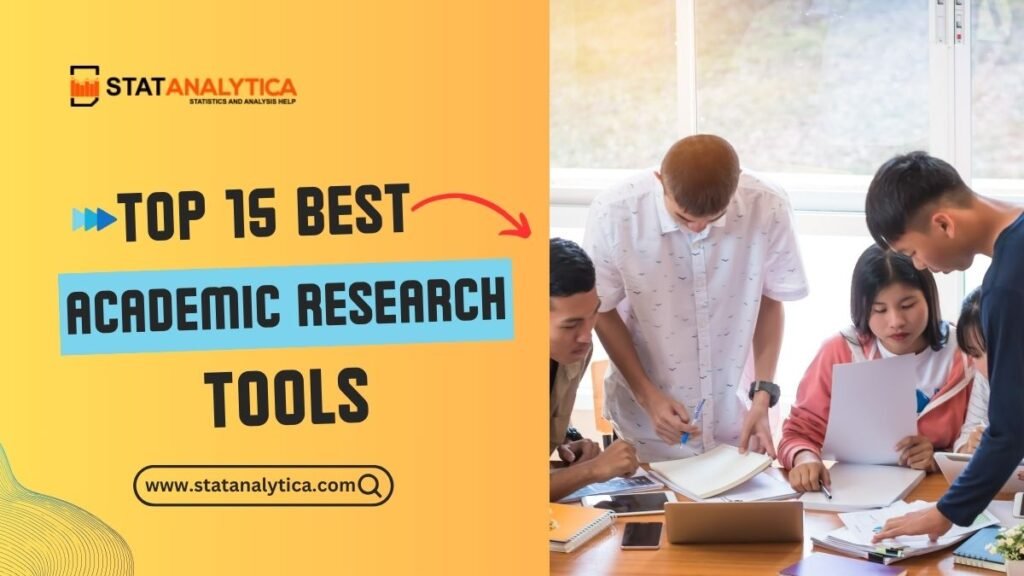
Using specialised tools has become more important in the ever changing field of academic research. These tools reference management, data visualisation, survey design, literature search, writing, and editing, are essential for improving the efficiency of the research process and the quality of scholarly output. Researchers can smoothly collect, assess, and share data using the top 15 academic research tools we are sharing, which will ultimately change the way research is carried out and done.
We will examine the essential resources for successful research in this guide, offering insightful analyses of the top three resources in each category—all discussed in simple language for a general audience. So let us start this discussing the ultimate top 3 for all the categories we have today.
Top 3 Academic Research Tools For Reference Management
Table of Contents
Reference management tools, also known as citation managers, are programs or online services that help researchers collect, organise, and cite references. These tools offer features such as storing references in a searchable database, attaching PDFs and other files, and auto-generating citations and bibliographies in the preferred citation style. They also allow users to share collections of references with others and sync references across multiple devices. Some popular reference management tools include EndNote, Mendeley, Zotero, and RefWorks.
| Unlock the door to academic success with our . Our team of experts is ready to help you in highly advanced crafted papers, meeting the highest standards of research and analysis. |

Zotero is a free, open-source research management program that has been a game-changer for many researchers, including myself. Here are some benefits of using Zotero in academic research, drawn from personal experience:
- Time-saving : Zotero’s web browser plugins make it easy to save item information from the web, eliminating the need to manually copy and paste citations. It saves time and effort, especially while dealing with multiple sources.
- Automatic PDF downloading : Zotero is good at capturing and downloading full-text PDFs from databases, which can be particularly useful when working with limited access to certain resources.
- Built-in tools : Zotero has a built-in tool to extract source information from PDFs, making it easier to manage and organise your research materials.
- Citation style flexibility : Zotero supports virtually all citation styles, allowing you to format your citations consistently and according to your institution’s guidelines.
- Word processor integration : Zotero’s word processor plugins let you “cite as you write,” making it easier to insert citations directly into your paper without having to switch between different applications .

EndNote is a popular citation management tool used by researchers, faculty, and students to store, organise, and cite references. Here are some benefits of using EndNote in academic research:
- Organisation: EndNote allows you to organise your research materials by creating folders, adding notes, and tagging citations, making it easier to locate and manage your sources.
- Better Time Management: By using EndNote, you can manage your research more efficiently, making it easier to meet deadlines and stay organised throughout the research process.
- Full-text PDF downloading: EndNote enables you to automatically attach and download full-text PDFs to saved references, making it easier to read, review, and annotate articles without having to switch between different applications.
- Collaboration: EndNote allows you to share your research with others, facilitating collaboration on research projects and group assignments.
- Bibliography: When it comes time to create a bibliography, EndNote sprinkles some magic. It seamlessly integrates with Word, turning your list of references from a headache-inducing task into a point-and-click breeze.

For researchers and journal editors among all the reference management tools Mendley is very popular. Other than its feature of ease of use here are few other features of it:
- Free of Cost: Best of all, Mendeley doesn’t cost anything. It’s free and all of us love these free tools as they are budget friendly and do not cost anything. Library Superpower: Mendeley is like a superhero library for your computer. It keeps all your research papers and articles in one organised place.
- Teamwork Friendly: If you’re working on a project with friends, Mendeley makes it easy to share your library. Teamwork just got a whole lot simpler.
- Highlight and Scribble: If you find something cool in a paper, you can highlight it and write notes on your computer. It’s like doodling on your homework but way more useful.
- Discover New Things: Mendeley even helps you discover new articles based on what you like. It’s like a friend suggesting cool stuff to read.
Top 3 Academic Research Tools For Data Visualisation And Analysis
Data visualisation and analysis tools are software or online platforms that help users create visual representations of data, making it easier to understand and interpret complex information. These tools enable users to generate various types of visualisations, such as charts, graphs, and maps, from their data sets. By presenting data visually, these tools facilitate quicker and more effective decision-making, allowing users to examine trends and information that is not immediately apparent from the raw data. Also it offers features for customising and sharing visualisations, making them valuable for both individual analysis and collaborative work. Some of the popular tools are as:

In academic research, Tableau is a data visualisation and analysis application that is becoming more and more popular. Using Tableau in academic research has several advantages, which I have personally experienced:
- Easy to use: Tableau is simple to use and intuitive to understand, making it available to researchers of all experience levels.
- Data visualisation: Tableau makes complex data easier to understand and analyse by enabling you to build dynamic, eye-catching charts, graphs, and maps.
- Integration with different data sources: Tableau facilitates the work with a variety of data types by helping you to access a vast range of data sources.
- Real-time data analysis : With Tableau’s ability to analyse data in real-time, you can act quickly and decisively based on up-to-date knowledge.
- R (Programming Language)

R is a programming language and software database used for statistical computing and graphics. It’s like a super-smart tool for crunching numbers, making cool charts, and handling data in a way that even non-computer wizards can understand. Following are some of the features of it:
- Flexibility and Extensibility : R’s flexible nature allows researchers to create custom functions, tailor analyses to specific needs, and interface with other programming languages like C, Python, and Java, enhancing its extensibility.
- Community Support: The R community is basically my online superhero squad. Whenever I got stuck on some coding conundrum, forums and groups were there with advice and solutions. It’s like having a 24/7 coding help hotline.
- Advanced Visualisations and Quick Implementation : R offers advanced visualisations and allows for the quick implementation of new theoretical approaches, which can be highly beneficial for researchers working with complex data.
- Continuous Evolution: R is always evolving. New packages, updates, and features keep popping up. It’s like your favourite app that keeps getting better with each update.
- Cost-Free Awesomeness: R doesn’t cost a cent. In a world where software can drain your wallet, R is the ultimate budget-friendly genius. It’s like getting a high-end software package without the hefty price tag.
- Python (Having Libraries Like Matplotlib And Seaborn)

Python is an adaptable and user-friendly programming language. It’s like a friendly guide for beginners, helping them write code effortlessly. With a vast library ecosystem, Python is a go-to language for tasks ranging from simple scripts to complex machine learning projects. Here is a short list of features of Python:
- Coding Zen: Python is like the cool kid in coding class. It’s easy to learn, which is a big relief when you’re juggling research and a gazillion other things.
- Open-Source and Cost-Effective : Python is open-source, platform-independent, and does not require fees or licences, making it a low-risk and cost-effective option for academic research.
- Versatile Toolbox: Python has a toolbox full of libraries. If we need to do something specific there’s probably a library for it. It’s like having a Swiss Army knife for data tasks.
- Machine Learning Marvel: Python is the superhero of machine learning. With libraries like TensorFlow and scikit-learn, it’s like having Iron Man’s suit for training models and making predictions.
- Data Analysis Capabilities : Python offers a large range of statistical tests, models, and capabilities, and it is mainly opted for machine learning and data analysis.
Top 3 Academic Research Tools For Survey Design And Data Collection
Survey design and data collection tools are software or online platforms that help researchers gather information from a specific group of people about their views, interests, or understandings. These tools offer various methods for creating surveys, such as questionnaires, e-surveys, telephone interviews, face-to-face interviews, focus groups, and electronic (e-mail or website) surveys. These tools offer features like customizable templates, question types, and data analysis capabilities, making them essential for conducting effective surveys and collecting valuable data for research purposes. Top 3 survey design and data collections tools are as:

Qualtrics is an online survey platform that helps you create and analyse surveys. It’s like a digital survey wizard, making it easy to collect and understand data. With user-friendly features, Qualtrics simplifies the survey process for everyone.
- Super Easy Surveys: Qualtrics turns survey-making into a piece of cake. You drag, drop, and boom – your survey is ready. No need for a PhD in tech.
- Data Heaven: When the replies start coming in, Qualtrics is a data wizard. It handles calculations and organisation like an expert. No more getting lost in a pile of info.
- Real-Time Feedback : Qualtrics allows researchers to listen to real-time feedback from students, faculty, and staff, making it easier to understand and improve the educational experience
- Student Budget Friendly: Qualtrics won’t cost you a lot. It’s like getting a premium survey experience without losing some weight of your wallet.
- Surveymonkey

SurveyMonkey is an online platform that creates and analyses surveys. It’s like having a survey guru in your pocket, simplifying the process with a user-friendly interface and tools for gathering insights. Some of the main features are as:
- User Friendly: SurveyMonkey takes the headache out of making surveys. It’s so user-friendly that even a middle school child could create a survey without asking for tech support.
- Mobile Friendly: In a world glued to phones, SurveyMonkey is mobile-friendly. Respondents can tap away on any device, making my surveys accessible and cool.
- Confidentiality: SurveyMonkey provides high-security features and ensures that it is in the right hands and there is no breach of security. SurveyMonkey is like the superhero security guard, ensuring your data stays locked and safe.
- Feedback Buffet: SurveyMonkey isn’t just for surveys; it’s a feedback buffet. From opinions to reviews, it gathers feedback like a pro, turning me into a feedback platter.
- Data Playground: SurveyMonkey transforms data into a playground once the responses start rolling in. Spreadsheet making is a thing of the past; insights are the rollercoaster of a data carnival.
- Redcap (Research Electronic Data Capture)

REDCap (Research Electronic Data Capture) is a user-friendly, secure, and web-based application for data collection and management in research. It’s like having a digital assistant that simplifies the process of gathering and organising research data efficiently and safely. Some of the attractive features of Redcap are as:
- User-Friendly Interface : REDCap offers a user-friendly web-based interface that puts researchers in total control of their work, allowing them to manage their own projects whenever and however they wish, through any browser on any device.
- Cost-Effective : REDCap is a cost-effective choice for academic research because it is a free, safe, web-based application that allows data capture for research studies.
- Wide Range of Forms: REDCap offers a versatile solution for creating surveys, whether they are straightforward or intricate. It’s akin to having a variety of forms at your disposal, allowing you to select and customise according to your specific needs, just like choosing items from a buffet.
- Customizable Surveys : REDCap allows researchers to customise their surveys to meet their local security policies and personalise features/functionality to address user needs.
- Secure Data Collection : REDCap provides a secure data collection tool that meets HIPAA compliance standards, making it a reliable and safe option for data collection.
Top 3 Academic Research Tools For Literature Search
Literature search tools are software or online platforms that help researchers find, organise, and analyse relevant information via different sources, such as educational articles, books, and other journals. These tools offer features like search engines for research papers, literature review software based on citation networks, tools for locating open access scientific papers, and more. Some of the best literature search tools are as:

PubMed is a free, easy-to-use search engine that lets you find and read articles on life sciences and biomedical topics. It has more than 35 million citations and abstracts, with links to full-text articles when available. It is managed by the National Library of Medicine and is a reliable source for researchers and students. Some of its main features are as:
- Free Access : PubMed is freely accessible, making it a cost-effective option for academic research.PubMed is like a scholarship for information, supporting my academic journey without draining my student budget.
- Abstract Summaries: Reading full articles can be time-consuming, but PubMed spoils me with abstracts. It’s like having a trailer before committing to the whole movie – efficient and smart.
- Historical Journey: PubMed is a time machine for research. It’s like flipping through the pages of history, seeing how studies evolved over time. Each article tells a story.
- Integration with Other Sources : PubMed can integrate data from other sources, making it easier to analyse and interpret data ensuring that different data sets will react collectively.
- Ease of Use : PubMed offers a user-friendly interface that allows researchers to search for articles using keywords or Medical Subject Headings (MeSH), making it easy to find relevant information.
- Google Scholar

Users can locate academic resources and scholarly literature, such as books, articles, theses, abstracts, and court opinions, using the free Google Scholar search engine. It searches many different sources, such as websites from universities, professional associations, academic publishers, and online repositories. Google Scholar attempts to organise papers according to researcher rankings. Some of its main features are as:
- No Membership Fee: Best of all, it’s free. Google Scholar is like a gift that keeps on giving, supporting my academic journey. It is freely accessible, making it a cost-effective option for academic research.
- Diverse Resource Hub: It’s not just articles; Google Scholar is a hub of diverse resources. It’s like a buffet of knowledge, offering books, theses, and conference papers on my research plate.
- Advanced Search Capabilities : Google Scholar offers advanced search capabilities, including filters and limiters, allowing researchers to refine their search results.
- My Virtual Bookshelf: Google Scholar is my digital bookshelf. It’s like having a tidy shelf where I can collect and revisit my favourite studies. No more going through piles of papers.

Scopus allows users to search both forward and backward in time for scientific, technical, and medical journal articles and the references included in those articles. Authors, researchers, students, librarians, universities, and others use the database to find, locate, and evaluate research output from around the world. Some of its main features are as:
- Global Coverage : Scopus covers journals from multiple disciplines, like science, technology, medicine, social sciences, arts, and humanities, offering a broad spectrum of research fields and topics.
- Keyword Treasure Hunt: Searching Scopus for particular keywords is similar to going on a scavenger hunt. Similar to looking for hidden treasures, each keyword reveals a wealth of useful information.
- Graphical Journey: Visualizing research connections is like a graphical journey on Scopus. It’s like having a map that shows the academic world’s complex web of ideas and influences.
- Academic Evaluation : Scopus Indexed Journals are often considered in academic evaluation processes, such as tenure and promotion decisions, as a measure of a researcher’s scholarly output and impact.
Top 3 Academic Research Tools For Writing And Editing
Writing and editing tools are software applications that help writers and content creators improve the quality of their work. It offers different features such as grammar and spell-check, style and readability analysis, and plagiarism detection. It can also help you with real-time feedback and suggestions to increase the overall quality of the content. Writing and editing tools are widely used to streamline the writing process, ensure accuracy, and maintain high standards of professionalism in written work. Some popular examples of these tools include Grammarly, Hemingway Editor, and Latex
LaTeX is a document generation system with high-quality and it is commonly used for technical and scientific documents. It is free software and is distributed under the LaTeX Project Public License. LaTeX is not a word processor; instead, it encourages authors to focus on the content of their documents, leaving the typesetting to the system. Some of its main highlights are as:
- Elegant Formatting: LaTeX produces high-quality typesetting, making documents look professional and polished. LaTeX is the fashion designer of documents. It’s like dressing up your research in a sleek suit, making it look elegant and professional .
- Mathematical Expertise: If you are Dealing with equations then LaTeX is like a maths wizard. It weaves equations into your text seamlessly, so your formulas look as good as your arguments.
- Easy Management of References and Citations : LaTeX allows researchers to label any piece of information they would like to use later for citations or as a reference, only requiring them to remember the label, and LaTeX handles everything.
- Portable and Platform-Independent : LaTeX files can be opened and altered with any text editor, and its formatting is consistent and automatically employed once set.
- Hemingway Editor

The Hemingway Editor is a user-friendly online tool that helps improve writing by highlighting and correcting common errors. It focuses on enhancing readability by identifying and simplifying complex sentences, passive voice , and adverbs. The tool offers both writing and editing modes, making it easy to create and refine content. Some of its main features are as:
- Simple & Powerful: In the world of writing tools, Hemingway Editor is simple yet powerful. It’s like the minimalist ninja, cutting through complexity and leaving my research polished and potent.
- Active Voice Enthusiast: Hemingway Editor is an active voice cheerleader. It’s like a coach nudging me to ditch passive constructions, making my writing punchier and more engaging.
- Readability Whisperer: Ensuring readability is Hemingway Editor’s secret weapon. It’s like having a readability whisperer, making sure my research doesn’t sound like an ancient manuscript but flows effortlessly.
- Formatting Friend: Hemingway Editor is also a formatting friend. It’s like a design consultant, making sure my text isn’t just clear but visually inviting, making my research a pleasure to read.

Grammarly is a digital writing tool that acts like a friendly grammar coach. It’s your online proofreader, catching typos, suggesting better words, and ensuring your sentences are clear and error-free. It helps you in making sure that there is no plagiarism in your content. Some its key highlights are as:
- Error Detective: Grammarly is my error detective. It spots typos, punctuation crimes, and grammatical slip-ups like detectives, saving me from embarrassing blunders.
- Plagiarism Protector: If you are worried about your accidental plagiarism then Grammarly is my protector. It’s like a shield, scanning my text to ensure it’s authentically mine and saving me from citation threats.
- Customizable Settings : Grammarly offers customizable settings, allowing researchers to adjust the tool according to their objectives and preferences like type of audience, knowledge level and other.
- Improving Writing Skills : Grammarly helps improve writing skills by providing suggestions and explanations for errors, helping researchers learn from their mistakes.
In conclusion, the top 15 academic research tools offer valuable support for various aspects of the research process. For reference management, tools like Zotero, Mendeley, and EndNote provide efficient organisation and citation capabilities.
In the realm of data visualisation and analysis, Tableau, Power BI, and Google Data Studio offer powerful solutions for interpreting and presenting research findings. Survey design and data collection are facilitated by Qualtrics, REDCap, and SurveyMonkey, which streamline the process of gathering and analysing data.
When it comes to literature search, Google Scholar, PubMed, and Scopus stand out as comprehensive and reliable resources for accessing scholarly literature. Finally, for writing and editing, Grammarly, Hemingway Editor, and LaTex offer indispensable support in enhancing the quality, clarity, and professionalism of academic writing. These tools collectively contribute to the efficiency, accuracy, and impact of academic research endeavours.
Image Reference
Related Posts

Step by Step Guide on The Best Way to Finance Car

The Best Way on How to Get Fund For Business to Grow it Efficiently
Have a language expert improve your writing
Run a free plagiarism check in 10 minutes, generate accurate citations for free.
- Knowledge Base
- Academic writing
What Is Academic Writing? | Dos and Don’ts for Students
Academic writing is a formal style of writing used in universities and scholarly publications. You’ll encounter it in journal articles and books on academic topics, and you’ll be expected to write your essays , research papers , and dissertation in academic style.
Academic writing follows the same writing process as other types of texts, but it has specific conventions in terms of content, structure and style.
| Academic writing is… | Academic writing is not… |
|---|---|
Instantly correct all language mistakes in your text
Upload your document to correct all your mistakes in minutes

Table of contents
Types of academic writing, academic writing is…, academic writing is not…, useful tools for academic writing, academic writing checklist.
Academics mostly write texts intended for publication, such as journal articles, reports, books, and chapters in edited collections. For students, the most common types of academic writing assignments are listed below.
| Type of academic text | Definition |
|---|---|
| A fairly short, self-contained argument, often using sources from a class in response to a question provided by an instructor. | |
| A more in-depth investigation based on independent research, often in response to a question chosen by the student. | |
| The large final research project undertaken at the end of a degree, usually on a of the student’s choice. | |
| An outline of a potential topic and plan for a future dissertation or research project. | |
| A critical synthesis of existing research on a topic, usually written in order to inform the approach of a new piece of research. | |
| A write-up of the aims, methods, results, and conclusions of a lab experiment. | |
| A list of source references with a short description or evaluation of each source. |
Different fields of study have different priorities in terms of the writing they produce. For example, in scientific writing it’s crucial to clearly and accurately report methods and results; in the humanities, the focus is on constructing convincing arguments through the use of textual evidence. However, most academic writing shares certain key principles intended to help convey information as effectively as possible.
Whether your goal is to pass your degree, apply to graduate school , or build an academic career, effective writing is an essential skill.
Prevent plagiarism. Run a free check.
Formal and unbiased.
Academic writing aims to convey information in an impartial way. The goal is to base arguments on the evidence under consideration, not the author’s preconceptions. All claims should be supported with relevant evidence, not just asserted.
To avoid bias, it’s important to represent the work of other researchers and the results of your own research fairly and accurately. This means clearly outlining your methodology and being honest about the limitations of your research.
The formal style used in academic writing ensures that research is presented consistently across different texts, so that studies can be objectively assessed and compared with other research.
Because of this, it’s important to strike the right tone with your language choices. Avoid informal language , including slang, contractions , clichés, and conversational phrases:
- Also , a lot of the findings are a little unreliable.
- Moreover , many of the findings are somewhat unreliable.
Clear and precise
It’s important to use clear and precise language to ensure that your reader knows exactly what you mean. This means being as specific as possible and avoiding vague language :
- People have been interested in this thing for a long time .
- Researchers have been interested in this phenomenon for at least 10 years .
Avoid hedging your claims with words like “perhaps,” as this can give the impression that you lack confidence in your arguments. Reflect on your word choice to ensure it accurately and directly conveys your meaning:
- This could perhaps suggest that…
- This suggests that…
Specialist language or jargon is common and often necessary in academic writing, which generally targets an audience of other academics in related fields.
However, jargon should be used to make your writing more concise and accurate, not to make it more complicated. A specialist term should be used when:
- It conveys information more precisely than a comparable non-specialist term.
- Your reader is likely to be familiar with the term.
- The term is commonly used by other researchers in your field.
The best way to familiarize yourself with the kind of jargon used in your field is to read papers by other researchers and pay attention to their language.
Focused and well structured
An academic text is not just a collection of ideas about a topic—it needs to have a clear purpose. Start with a relevant research question or thesis statement , and use it to develop a focused argument. Only include information that is relevant to your overall purpose.
A coherent structure is crucial to organize your ideas. Pay attention to structure at three levels: the structure of the whole text, paragraph structure, and sentence structure.
| Overall structure | and a . . |
|---|---|
| Paragraph structure | when you move onto a new idea. at the start of each paragraph to indicate what it’s about, and make clear between paragraphs. |
| Sentence structure | to express the connections between different ideas within and between sentences. to avoid . |
Well sourced
Academic writing uses sources to support its claims. Sources are other texts (or media objects like photographs or films) that the author analyzes or uses as evidence. Many of your sources will be written by other academics; academic writing is collaborative and builds on previous research.
It’s important to consider which sources are credible and appropriate to use in academic writing. For example, citing Wikipedia is typically discouraged. Don’t rely on websites for information; instead, use academic databases and your university library to find credible sources.
You must always cite your sources in academic writing. This means acknowledging whenever you quote or paraphrase someone else’s work by including a citation in the text and a reference list at the end.
| In-text citation | Elsewhere, it has been argued that the method is “the best currently available” (Smith, 2019, p. 25). |
| Reference list | Smith, J. (2019). (2nd ed.). New York, NY: Norton. |
There are many different citation styles with different rules. The most common styles are APA , MLA , and Chicago . Make sure to consistently follow whatever style your institution requires. If you don’t cite correctly, you may get in trouble for plagiarism . A good plagiarism checker can help you catch any issues before it’s too late.
You can easily create accurate citations in APA or MLA style using our Citation Generators.
APA Citation Generator MLA Citation Generator
Correct and consistent
As well as following the rules of grammar, punctuation, and citation, it’s important to consistently apply stylistic conventions regarding:
- How to write numbers
- Introducing abbreviations
- Using verb tenses in different sections
- Capitalization of terms and headings
- Spelling and punctuation differences between UK and US English
In some cases there are several acceptable approaches that you can choose between—the most important thing is to apply the same rules consistently and to carefully proofread your text before you submit. If you don’t feel confident in your own proofreading abilities, you can get help from Scribbr’s professional proofreading services or Grammar Checker .
Academic writing generally tries to avoid being too personal. Information about the author may come in at some points—for example in the acknowledgements or in a personal reflection—but for the most part the text should focus on the research itself.
Always avoid addressing the reader directly with the second-person pronoun “you.” Use the impersonal pronoun “one” or an alternate phrasing instead for generalizations:
- As a teacher, you must treat your students fairly.
- As a teacher, one must treat one’s students fairly.
- Teachers must treat their students fairly.
The use of the first-person pronoun “I” used to be similarly discouraged in academic writing, but it is increasingly accepted in many fields. If you’re unsure whether to use the first person, pay attention to conventions in your field or ask your instructor.
When you refer to yourself, it should be for good reason. You can position yourself and describe what you did during the research, but avoid arbitrarily inserting your personal thoughts and feelings:
- In my opinion…
- I think that…
- I like/dislike…
- I conducted interviews with…
- I argue that…
- I hope to achieve…
Long-winded
Many students think their writing isn’t academic unless it’s over-complicated and long-winded. This isn’t a good approach—instead, aim to be as concise and direct as possible.
If a term can be cut or replaced with a more straightforward one without affecting your meaning, it should be. Avoid redundant phrasings in your text, and try replacing phrasal verbs with their one-word equivalents where possible:
- Interest in this phenomenon carried on in the year 2018 .
- Interest in this phenomenon continued in 2018 .
Repetition is a part of academic writing—for example, summarizing earlier information in the conclusion—but it’s important to avoid unnecessary repetition. Make sure that none of your sentences are repeating a point you’ve already made in different words.
Emotive and grandiose
An academic text is not the same thing as a literary, journalistic, or marketing text. Though you’re still trying to be persuasive, a lot of techniques from these styles are not appropriate in an academic context. Specifically, you should avoid appeals to emotion and inflated claims.
Though you may be writing about a topic that’s sensitive or important to you, the point of academic writing is to clearly communicate ideas, information, and arguments, not to inspire an emotional response. Avoid using emotive or subjective language :
- This horrible tragedy was obviously one of the worst catastrophes in construction history.
- The injury and mortality rates of this accident were among the highest in construction history.
Students are sometimes tempted to make the case for their topic with exaggerated , unsupported claims and flowery language. Stick to specific, grounded arguments that you can support with evidence, and don’t overstate your point:
- Charles Dickens is the greatest writer of the Victorian period, and his influence on all subsequent literature is enormous.
- Charles Dickens is one of the best-known writers of the Victorian period and has had a significant influence on the development of the English novel.
There are a a lot of writing tools that will make your writing process faster and easier. We’ll highlight three of them below.
Paraphrasing tool
AI writing tools like ChatGPT and a paraphrasing tool can help you rewrite text so that your ideas are clearer, you don’t repeat yourself, and your writing has a consistent tone.
They can also help you write more clearly about sources without having to quote them directly. Be warned, though: it’s still crucial to give credit to all sources in the right way to prevent plagiarism .
Grammar checker
Writing tools that scan your text for punctuation, spelling, and grammar mistakes. When it detects a mistake the grammar checke r will give instant feedback and suggest corrections. Helping you write clearly and avoid common mistakes .
You can use a summarizer if you want to condense text into its most important and useful ideas. With a summarizer tool, you can make it easier to understand complicated sources. You can also use the tool to make your research question clearer and summarize your main argument.
Use the checklist below to assess whether you have followed the rules of effective academic writing.
- Checklist: Academic writing
I avoid informal terms and contractions .
I avoid second-person pronouns (“you”).
I avoid emotive or exaggerated language.
I avoid redundant words and phrases.
I avoid unnecessary jargon and define terms where needed.
I present information as precisely and accurately as possible.
I use appropriate transitions to show the connections between my ideas.
My text is logically organized using paragraphs .
Each paragraph is focused on a single idea, expressed in a clear topic sentence .
Every part of the text relates to my central thesis or research question .
I support my claims with evidence.
I use the appropriate verb tenses in each section.
I consistently use either UK or US English .
I format numbers consistently.
I cite my sources using a consistent citation style .
Your text follows the most important rules of academic style. Make sure it's perfect with the help of a Scribbr editor!
Is this article helpful?
Other students also liked.
- Taboo words in academic writing
- How to write more concisely
- Transition Words & Phrases | List & Examples
More interesting articles
- A step-by-step guide to the writing process
- Active vs. Passive Constructions | When to Use the Passive Voice
- Avoid informal writing
- Avoid rhetorical questions
- Be conscious of your adverb placement
- Capitalization in titles and headings
- Exclamation points (!)
- First-Person Pronouns | List, Examples & Explanation
- Forging good titles in academic writing
- Free, Downloadable Educational Templates for Students
- Free, Downloadable Lecture Slides for Educators and Students
- How to avoid repetition and redundancy
- How to write a lab report
- How to write effective headings
- Language mistakes in quotes
- List of 47 Phrasal Verbs and Their One-Word Substitutions
- Myth: It’s incorrect to start a sentence with “because”
- Myth: It’s an error to split infinitives
- Myth: It’s incorrect to start a sentence with a coordinating conjunction (and, but, or, for, nor, yet, so)
- Myth: Paragraph transitions should be placed at the ends of paragraphs
- Tense tendencies in academic texts
- Using abbreviations and acronyms
- What Is Anthropomorphism? | Definition & Examples
- What Is Sentence Case? | Explanation & Examples
- What Is Title Case? | Explanation & Worksheet
- Writing myths: The reasons we get bad advice
- Writing numbers: words and numerals
"I thought AI Proofreading was useless but.."
I've been using Scribbr for years now and I know it's a service that won't disappoint. It does a good job spotting mistakes”
Educational resources and simple solutions for your research journey

Top 16 Digital Tools That Every Researcher Should Know About
Using digital tools for researchers effectively can be the difference between an average and an excellent piece of research. But today, with the long list of research tools available online, it is only natural for busy researchers to be baffled when it comes to making the right choice for specific needs. With considerations of time, cost, effectiveness and quality, there is a lot to check before you make the choice. We don’t want you to spend hours just looking for the best tools for researchers, so we’ve rounded up some of the most effective digital tools for researchers to make your life simpler.
In this comprehensive article, we have compiled a list of 16 useful online tools for researchers at various stages of the research journey. These tools will streamline your research process, help you stay organized, and provide you with easy access to the information you need. From reference management software to digital libraries, these cutting-edge tools cater to the needs of both experienced and novice researchers alike. Whether you’re working on a major research project or just starting out, this blog will help you get ahead of the curve and make your research journey a tad (we aren’t making big promises) bit easier.
Table of Contents
Why are digital tools for researchers important
Before any digital tools for researchers were introduced, academics had to rely on old-school manual methods that were typically time-consuming, labor-intensive, and also limited in scope. For instance, you had to subscribe to journals or physically visit libraries and spend hours searching and sifting through tomes before finding the most relevant information. And once that was done, the process of organizing, storing, and referencing data was another challenge you had to overcome.
In contrast, online tools for researchers offer a wealth of information and resources at your fingertips today. With the option to search and access vast amounts of knowledge with a few clicks, researchers are able to boost their efficiency and effectiveness at work.
And it’s not just limited to online tools for researchers that allow you to easily store, organize, and manage information, there are a number of tools that can help you hone your writing, check for plagiarism, find the right journal, collaborate with other researchers, and share your knowledge, ideas, and resources. The rapid development of digital tools for researchers have revolutionized the way researchers work, making way for faster innovation and more groundbreaking research.

Types of tools for researchers
There are various types of online tools for researchers to choose from. These tools can be classified into various categories such as planning and management of research projects, literature search, data collection and analysis, reference management, editing and paraphrasing, and collaboration and communication. These digital tools for researchers have revolutionized the way academics work, adding to their time, productivity and effectiveness; this in turn makes research more accessible, efficient, and collaborative. Let’s take a look at some top tools for researchers across these key stages in the researcher journey.
Reference Management Tools
Reference management tools are great time saving tools for researchers. Not only do they allow you to create a library of relevant articles, they help you format your references, detect duplicate entries and replace incomplete references, and even share articles with other researchers. Furthermore, they are also extremely useful tools for researchers when it comes to correctly linking sources and citing referenced articles.
Among the top reference management tools for researchers, Zotero, Mendeley, and EndNote are the most widely used.
Zotero has quickly become one of the must-have tools for researchers to capture and preserve high-quality publication data from various sources, including journal articles, websites, newspapers, and PDFs. Its integration with popular Word processors such as Microsoft Word, LibreOffice, and Google Docs allows you to efficiently manage citations and bibliographies as you write. The software’s built-in PDF reader enables you to identify and extract cited quotations and comments, which can be directly saved as notes. What sets Zotero apart is its advanced search feature, which enables users to perform complex searches, such as locating articles added in the last month by mentioning a specific keyword and creating auto-updating collections. Zotero can also identify retracted papers and sends out an alert when you attempt to cite a retracted paper.
Zotero follows the freemium model, where one can get 300 MB in the free version with additional storage available for a fee starting at $20/year .
An offering by Elsevier, Mendeley is among the best reference management tools for researchers that combines an intuitive, user-friendly interface with powerful organizational features. With Mendeley, you can store and manage sources, take notes, collaborate with others, and discover new research in your field. Mendeley’s PDF viewer has an excellent, easy-to-use, built-in capability with the option of editing a document simultaneously with other Mendeley users. ‘Mendeley Notebook’, a feature of Mendeley, helps you collate all your highlights and notes from multiple PDFs. ‘Mendeley Cite’, another of its features, is a citation plugin for Microsoft Word that lets you insert references and bibliographies into your document.
Mendeley is a free citation and paper management tool with up to 2 GB of cloud storage. It has a desktop application, mobile app, and Chrome browser extension, making it a top choice among tools for researchers.
Mendeley offers both a free and a premium version, where users get 2 GB in the free version and additional storage space with pricing starting at $55/year .
Endnote is one of the paid reference management tools for researchers. It allows researchers to insert citations into the text, and simultaneously creates a bibliography with its “Cite While You Write” feature in Microsoft Word. Additionally, one can align and format the article as per the target journal requirements using its “Manuscript Matcher” feature. You can also conduct large-scale literature reviews with Endnote’s powerful analysis tools. Endnote is available in the cloud and accessible anywhere, providing researchers with the flexibility to work from any location.
Endnote offers a range of pricing options, starting at $124.95/year . It is one of the must-have tools for researchers keen on saving time and energy!

Academic Writing Tools
If you are not taking advantage of academic writing tools for researchers, well, you’re missing out on a lot. The range of things academic writing tools can do for you is astonishing – language editing, abstract writing, plagiarism checking and so much more! While there are a number of online tools for reseachers that can help improve your academic writing, here are our top choices in this category that you should know about.
iThenticate
iThenticate by Turnitin is an online plagiarism checker designed specifically for researchers and academics to review their manuscripts prior to journal submission and publication. iThenticate is one of the most popular tools for researchers looking to check their writing for originality and ensure they have cited all sources appropriately.
With its advanced plagiarism detection technology, iThenticate compares a submission to an extensive database of web pages and scholarly content before producing a similarity score and report. Researchers can use this report to eliminate any inadvertent instances of plagiarism and other blunders in their research papers.
The price for an iThenticate license starts at $100 for a manuscript and is valid for multiple plagiarism checks for this single document over a year. If you need to check more than one manuscript, you can opt for an annual license at a higher price.
One of the well-known tools for researchers, Scholarcy is an innovative AI engine that helps you analyze different sections of an article, filter out the noise, and deliver a precise structured summary of the research. Scholarcy doesn’t just condense papers into referenced lay summaries, it highlights key claims and statistics mentioned in the research paper that are most useful to your work.
It also extracts all the tables and figures and links to their cited location in the text, saving researchers hours of time searching for the most relevant papers. The smart AI engine is also a great tool for researchers looking to generate lay summaries that can help promote their research to a broader audience
You can use the free Scholarcy browser extension on Chrome or Edge to create summary flashcards online or build your own personal interactive library with a subscription of $7.99 per month.
Scrivener is among the underrated tools for researchers that can help make researchers’ lives simpler if used effectively. It has a user-friendly interface that allows researchers to easily organize their research notes, documents, and outlines. Scrivener gives you three ways to organize your projects: the Binder – which lets you manage folders and text, the Outliner – which helps you outline your research before you write it, and the Corkboard – to help you plan and organize your ongoing tasks.
Scrivener also has a mobile app that syncs with your devices ensuring everything is in one place. This makes it a great option for those who want to walk around and research ideas or take notes on your phone.
Scrivener offers a free trial period, with lifetime licenses available from $63.56 for MacOS and Windows.
Paperpal is as multifaceted as a Swiss Knife and stands tall among online academic writing tools for researchers. With in-depth language and grammar checks, instant and precise academic translations, relevant subject-specific writing recommendations, and critical technical checks, its suite of tools has you covered from the first draft itself. Use the Paperpal for Word plug-in and improve your language as you write in Microsoft Word, including real-time suggestions on vocabulary and phrasing.
Turn to Paperpal for Web to enhance your content with instant checks to ensure error-free language and grammar, clarity, and readability. Choose Paperpal for Manuscript if you have a manuscript ready for submission; its comprehensive language and technical checks ensure your work meets journal guidelines by flagging problem areas that could lead to desk rejection.
The best part about Paperpal, also something that makes it different from other more generic grammar editing tools, is that it is tailored for researchers and academic writing. You can get up to 500 edits for free on Paperpal for Word and Web or enjoy unlimited support at just $99 per year. Paperpal for Manuscript gives you an edited version of your article with suggestions in track changes for just $29.

Project Management Tools
There are several online tools for researchers to manage and organize their work, including keeping track of task completion, setting deadlines, and just having everything in one place. Four tools for researchers that must be there in your productivity kit are Trello, GanttPRO, Evernote, and My Research Projects.
You can use Trello to visually organize your ideas on its boards with the help of interactive cards. These cards can be used in multiple ways – you can create lists, assign tasks, message and tag those you are collaborating with, link files, add due dates–all on the virtual “back” of the card. You can also drag cards between lists, copy cards that you use often (or rather, use the cards as templates), and send cards to other boards. Basically, you can see your entire research process on a single Trello board.
This is a useful tool for researchers involved in large collaborative projects that span the globe. Trello has a free version that offers limited features with pricing models starting at $5 a month.
GanttPRO is another tool for researchers that helps you organize your thoughts better. A Gantt chart timeline on GanttPRO is the best way to visualize tasks, know their start and end dates, and track your progress along the way. The vertical and horizontal axes in a Gantt Chart present a visual summary of how various aspects of your research project are progressing, which allows you to address specific tasks that need extra or immediate attention.
GanttPRO is hosted in the cloud, which makes is easily accessible. It offers users a free trial with the option to choose from plans starting at $7.99 per month.
A productive way to jot down notes and ideas and sort through your research materials, Evernote is one of the most popular online tools for researchers. With Evernote, you can organize your research by a simple notebook structure to keep similar notes together or creating tags and folders for specific purposes.
You can save webpages, articles, or screenshots to your Evernote notebook and use the handy multimedia feature to enhance these by adding new text, images, documents, and even audio messages captured with its inbuilt recorder. Evernote also helps you sync your notes across devices so you can manage your notes across multiple platforms.
The basic version of Evernote lets you create and save notes but has limitations on storage space. You can buy more storage by opting for a paid subscription plan, which is currently available from $5.83 a month at ongoing discounted prices.
My Research Projects
My Research Projects by Researcher.Life is designed for researchers and helps you plan, manage, and communicate your work effectively. It promises end-to-end support in transforming your research into a well-written manuscript with suggestions on suitable journals for your research and guidance on the most relevant literature to cite. You can use the comprehensive submission readiness check to ensure your manuscript meets journal guidelines, with checks for language quality, structural completeness, clarity and consistency, and mandatory declarations. You can also generate detailed article summaries to help you convey your research findings more effectively.
My Research Projects lets you check one manuscript and get a detailed report for free by subscribing to Researcher.Life. You can unlock premium checks for multiple manuscripts by upgrading to the Prime Pack for $99 a year.
Academic Search Engines
As researchers you are expected to keep up with the latest developments in your own and related research fields. Yet, with the exponential growth in research output, this is far from easy. This is what makes academic search engines invaluable to academics searching for relevant scientific information. They use keywords to help researchers find, access and read about the latest most relevant research, including peer-reviewed articles, genuine information, author home pages, and university websites.
Google Scholar, R Discovery, and Scopus are our top tools for researchers in this category.
R Discovery
R Discovery is a strong contender when it comes to the best literature search and reading tools for researchers. An AI-powered app for researchers, R Discovery boasts of an expanding library of research content that includes over 100 million research papers across 9.5 million topics and more than 32,000 journals worldwide. It uses your topics of interest to create a personalized reading feed, with suggestions on top reads, smart summaries, and other features to help you discover the right research in minutes.
This includes open access articles, preprints, and pay-walled content (accessible through institutional credentials) across all major subject areas, including biology, medicine, philosophy, political science, environmental science, social sciences, and psychology. The best part is that this app for researchers continually upgrades its features and eliminated predatory journals to ensure you have access to reliable research that works for you.
R Discovery is one of the many tools for researchers developed by Researcher.Life and is completely free to install and use. It is available on both mobile and web, allowing for streamlined reading on your preferred device.

Google Scholar
If you’re an academic, you probably have used Google Scholar sometime in your research journey. It is one of the most used tools for researchers and acts as an online search engine for academics looking for scholarly literature and relevant sources to cite. It is tailored for academics, which means you can use different keywords to look up various research articles, theses, books, and conference papers to support your research study.
Researchers can also search for authors, journals, and other titles and can even create an account to save their search results. The one drawback here though is that you will need to keep searching until you find related research, and even then you will still need to browse through these individually to find the most relevant content for your research topic.
Another popular academic search tool for researchers is Scopus, an offering by Elsevier that is very similar to Google Scholar and Microsoft Academic. The largest abstract and citation database of peer-reviewed research with over 1.7 billion cited references, Scopus houses content indexed from more than 25,000 active titles and 7,000 publishers, all carefully vetted and selected by an independent review board.
With Scopus, you can look for articles, journals, and any other sources that will help you write better research. You can also refine your literature search by filtering for author name or affiliation among others. Scopus also has analytical tools to help you visualize and compare research data – that is, you can view author, journal, and article impact metrics through the detailed research output and trends reports that Scopus provides.
Scopus works as an API that can be integrated into an institution’s repository or research information management systems. While it is free to use for non-subscribers, there is limited access to content with additional costs to access paywalled articles on this platform.

Journal Selection Tools
Given the enormous number of scholarly journals around and new ones coming up every year, it can be hard to select the best journal for your research paper. Despite its challenges, the process of finding the perfect journal, which is respected, relevant, and reliable, is one of the most critical tasks to get right for researchers. This is why good online journal finders are invaluable tools for researchers.
Elsevier’s Journal Finder tool and the Global Journal Database (GJD) are two pretty effective journal selection tools for researchers.
Journal Finder
The Journal Finder tool by Elsevier, one of the largest publishers of peer-reviewed journals across disciplines, is a great solution for authors looking to shortlist journals for their work. Just use relevant keywords, titles, or your research paper abstract to get a list of recommended Elsevier journals that publish research similar to yours.
Its intelligent machine learning algorithm uses terms specific to the corresponding research field to generate the best matches for your article. You can choose from the top of the list or sort this further using filters based on your preferences. The Journal Finder also lists journals with open-access publishing options and those that cover multidisciplinary research fields.
Elsevier can be used for free to search for journals related to your research.
Global Journal Database
The Global Journal Database, developed by Researcher.Life, comprises of more than 43,000 journals indexed in reputed public directories like Directory of Open Access Journals (DOAJ), Scopus, and Web of Science. Researchers can search for relevant journals using the title or ISSN, similar topics, research paper abstracts, and even manuscripts; the advanced AI engine will use this to generate the best journals for you.
Each journal recommendation comes with a detailed journal report that has key information about shortlisted journals, including publisher details, journal metrics, author instructions, the editorial review process, and even a list of the latest articles published. With the Global Journal Database, you can see where your preferred journal is indexed and browse its publishing history to better understand its scope. The broad journal coverage, multiple search modes, and detailed journal reports make this an exceptional tool for researchers, simplifying and speeding up the often-daunting journal selection process.
The Global Journal Database is available free with a Researcher.Life Essentials Pack subscription.

Wrapping Up
Researchers everywhere are on a quest to uncover new insights and come up with ground-breaking research. Choosing the right digital tools for researcher and using these effectively can make your journey from brainstorming to breakthroughs a smoother, easier, and faster one.

If you’re looking for a seamless transition between various tools, choose Researcher.Life, which brings together innovative solutions to accelerate and optimize each stage of your research journey. Turn to Paperpal the next time you’re perplexed by language nuances, swipe through R Discovery’s reading recommendations to keep up with the latest developments, manage your research effectively with My Research Projects, or find the right journal for your paper with the Global Journal Database. Experience Researcher.Life and its many bespoke tools for researchers.
Editage All Access is a subscription-based platform that unifies the best AI tools and services designed to speed up, simplify, and streamline every step of a researcher’s journey. The Editage All Access Pack is a one-of-a-kind subscription that unlocks full access to an AI writing assistant, literature recommender, journal finder, scientific illustration tool, and exclusive discounts on professional publication services from Editage.
Based on 22+ years of experience in academia, Editage All Access empowers researchers to put their best research forward and move closer to success. Explore our top AI Tools pack, AI Tools + Publication Services pack, or Build Your Own Plan. Find everything a researcher needs to succeed, all in one place – Get All Access now starting at just $14 a month !
Related Posts

What are the Best Research Funding Sources

Inductive vs. Deductive Research Approach

MEET MOXIE,
Your ai-powered academic coach.
The premier ethical AI assistant that enhances your research process, refines your arguments, and elevates your academic voice – without compromising your original scholarship .

Testimonials

Research and Refine with Moxie
Moxie is an advanced AI-powered tool for research and academic writing designed to assist you, not replace your critical thinking and expertise.
Moxie makes a difference with:
- Research Design: Leverage our suite of AI tools that help you design rigorous research aligned with your academic objectives.
- AI-powered Writing Assistance: Strengthen your thesis arguments, refine your style, and eliminate grammar errors.
- Personalized Feedback: Receive targeted suggestions on clarity, structure, and academic tone in real time.

What Sets Us Apart from Other AI Tools
Unlike AI content generators, Moxie never replaces your original work. We empower scholars to enhance their own critical thinking and writing skills, ensuring academic integrity every step of the way.

Access Premium AI Models
Leverage our curated selection of premium AI models, each tailored for academic use cases – maximize your access, minimize your costs.

Engage in Interactive Learning Sessions
Attend weekly professional development and group coaching sessions to refine your academic skills, enhance your AI literacy, discuss best practices, and explore new advancements in AI.

Experience Moxie in Action
As a Moxie member, you’ll learn how to harness the full potential of our AI-powered features to enhance your research and academic writing skills. Watch and explore step-by-step instructions on utilizing Moxie’s research design tools, AI writing assistance, and personalized feedback systems.
Research The Moxie Way
The old way.
- Only get help when your professor or colleague is available
- Long stretches of radio silence
- Feeling judged or criticized on your first draft (hello, imposter syndrome)
- Dealing with writer’s block and feeling uninspired
- Cramming writing blocks into an already busy schedule
- Not sure how to sound “scholarly”
- Not sure how to prioritize ideas
- Struggling to write because English isn’t your first language

The Moxie Way
- Get personalized feedback and guidance any time
- Discover new tools and customized support as you advance
- Save time and streamline your academic writing process
- Break through dreaded writer’s block
- Maintain and enhance your unique voice
- Get help identifying knowledge gaps
- Learn new writing and research skills
- Creates a common feedback language among professors and students
The Essential AI Writing Tool for Academics
Moxie is here to empower you. Our AI writing assistant helps researchers, graduate students, professors, authors-on-the-rise, and even non-native English speakers by providing in-depth research assistance and actionable feedback.
- Graduate Students: Streamline your research process, refine your arguments, and confidently submit thorough research proposals, papers, and manuscripts with Moxie’s guidance.
- Doctoral Candidates: Take your dissertation to the next level. Develop a clear, concise, and well-supported thesis with Moxie’s academic research and writing support.
- Faculty: Enhance your research productivity and ensure your writing meets the highest academic standards with Moxie’s advanced AI-powered academic writing tools.
- Authors: Focus on developing your ideas and strengthening your stance using AI tools for preparing to publish.
- Non-native English Users: Get suggestions to address subject-verb agreements, grammar mistakes and more to confidently navigate the nuances of academic English as well as proper citation formatting according to different style guides (APA, MLA, Chicago).

Putting Moxie to the Test

AI Research Tool List
Choose from a wide range of AI-powered research writing tools tailored for faculty, graduate students, proposal writers, and researchers in any field.

Quick Q&A
Simply answer a few straightforward questions to clarify the purpose of your study or the parameters of your research without having to rely on complex prompts.

Instant Guidance
Get AI-driven insights, suggestions, or content recommendations in seconds that align with your academic research and writing goals.
Elevate Your Research with the AI Power Stack
Dive into a curated collection of AI tools specifically designed to enhance and streamline your academic journey.
Join the academic and scientific writing revolution
Create impactful manuscripts and fast-track journal submissions with our smart writing tools for researchers
Paperpal It

Want practical strategies and expert advice on writing, editing, and submission?
Check our Blog

Top 21 must-have digital tools for researchers
Last updated
12 May 2023
Reviewed by
Jean Kaluza
Research drives many decisions across various industries, including:
Uncovering customer motivations and behaviors to design better products
Assessing whether a market exists for your product or service
Running clinical studies to develop a medical breakthrough
Conducting effective and shareable research can be a painstaking process. Manual processes are sluggish and archaic, and they can also be inaccurate. That’s where advanced online tools can help.
The right tools can enable businesses to lean into research for better forecasting, planning, and more reliable decisions.
- Why do researchers need research tools?
Research is challenging and time-consuming. Analyzing data , running focus groups , reading research papers , and looking for useful insights take plenty of heavy lifting.
These days, researchers can’t just rely on manual processes. Instead, they’re using advanced tools that:
Speed up the research process
Enable new ways of reaching customers
Improve organization and accuracy
Allow better monitoring throughout the process
Enhance collaboration across key stakeholders
- The most important digital tools for researchers
Some tools can help at every stage, making researching simpler and faster.
They ensure accurate and efficient information collection, management, referencing, and analysis.
Some of the most important digital tools for researchers include:
Research management tools
Research management can be a complex and challenging process. Some tools address the various challenges that arise when referencing and managing papers.
.css-10ptwjf{-webkit-align-items:center;-webkit-box-align:center;-ms-flex-align:center;align-items:center;background:transparent;border:0;color:inherit;cursor:pointer;-webkit-flex-shrink:0;-ms-flex-negative:0;flex-shrink:0;-webkit-text-decoration:underline;text-decoration:underline;}.css-10ptwjf:disabled{opacity:0.6;pointer-events:none;} Zotero
Coined as a personal research assistant, Zotero is a tool that brings efficiency to the research process. Zotero helps researchers collect, organize, annotate, and share research easily.
Zotero integrates with internet browsers, so researchers can easily save an article, publication, or research study on the platform for later.
The tool also has an advanced organizing system to allow users to label, tag, and categorize information for faster insights and a seamless analysis process.
Messy paper stacks––digital or physical––are a thing of the past with Paperpile. This reference management tool integrates with Google Docs, saving users time with citations and paper management.
Referencing, researching, and gaining insights is much cleaner and more productive, as all papers are in the same place. Plus, it’s easier to find a paper when you need it.
Acting as a single source of truth (SSOT), Dovetail houses research from the entire organization in a simple-to-use place. Researchers can use the all-in-one platform to collate and store data from interviews , forms, surveys , focus groups, and more.
Dovetail helps users quickly categorize and analyze data to uncover truly actionable insights . This helps organizations bring customer insights into every decision for better forecasting, planning, and decision-making.
Dovetail integrates with other helpful tools like Slack, Atlassian, Notion, and Zapier for a truly efficient workflow.
Putting together papers and referencing sources can be a huge time consumer. EndNote claims that researchers waste 200,000 hours per year formatting citations.
To address the issue, the tool formats citations automatically––simultaneously creating a bibliography while the user writes.
EndNote is also a cloud-based system that allows remote working, multiple-user interaction and collaboration, and seamless working on different devices.
Information survey tools
Surveys are a common way to gain data from customers. These tools can make the process simpler and more cost-effective.
With ready-made survey templates––to collect NPS data, customer effort scores , five-star surveys, and more––getting going with Delighted is straightforward.
Delighted helps teams collect and analyze survey feedback without needing any technical knowledge. The templates are customizable, so you can align the content with your brand. That way, the survey feels like it’s coming from your company, not a third party.
SurveyMonkey
With millions of customers worldwide, SurveyMonkey is another leader in online surveys. SurveyMonkey offers hundreds of templates that researchers can use to set up and deploy surveys quickly.
Whether your survey is about team performance, hotel feedback, post-event feedback, or an employee exit, SurveyMonkey has a ready-to-use template.
Typeform offers free templates you can quickly embed, which comes with a point of difference: It designs forms and surveys with people in mind, focusing on customer enjoyment.
Typeform employs the ‘one question at a time’ method to keep engagement rates and completions high. It focuses on surveys that feel more like conversations than a list of questions.
Web data analysis tools
Collecting data can take time––especially technical information. Some tools make that process simpler.
For those conducting clinical research, data collection can be incredibly time-consuming. Teamscope provides an online platform to collect and manage data simply and easily.
Researchers and medical professionals often collect clinical data through paper forms or digital means. Those are too easy to lose, tricky to manage, and challenging to collaborate on.
With Teamscope, you can easily collect, store, and electronically analyze data like patient-reported outcomes and surveys.
Heap is a digital insights platform providing context on the entire customer journey . This helps businesses improve customer feedback , conversion rates, and loyalty.
Through Heap, you can seamlessly view and analyze the customer journey across all platforms and touchpoints, whether through the app or website.
Another analytics tool, Smartlook, combines quantitative and qualitative analytics into one platform. This helps organizations understand user behavior and make crucial improvements.
Smartlook is useful for analyzing web pages, purchasing flows, and optimizing conversion rates.
Project management tools
Managing multiple research projects across many teams can be complex and challenging. Project management tools can ease the burden on researchers.
Visual productivity tool Trello helps research teams manage their projects more efficiently. Trello makes product tracking easier with:
A range of workflow options
Unique project board layouts
Advanced descriptions
Integrations
Trello also works as an SSOT to stay on top of projects and collaborate effectively as a team.
To connect research, workflows, and teams, Airtable provides a clean interactive interface.
With Airtable, it’s simple to place research projects in a list view, workstream, or road map to synthesize information and quickly collaborate. The Sync feature makes it easy to link all your research data to one place for faster action.
For product teams, Asana gathers development, copywriting, design, research teams, and product managers in one space.
As a task management platform, Asana offers all the expected features and more, including time-tracking and Jira integration. The platform offers reporting alongside data collection methods , so it’s a favorite for product teams in the tech space.
Grammar checker tools
Grammar tools ensure your research projects are professional and proofed.
No one’s perfect, especially when it comes to spelling, punctuation, and grammar. That’s where Grammarly can help.
Grammarly’s AI-powered platform reviews your content and corrects any mistakes. Through helpful integrations with other platforms––such as Gmail, Google Docs, Twitter, and LinkedIn––it’s simple to spellcheck as you go.
Another helpful grammar tool is Trinka AI. Trinka is specifically for technical and academic styles of writing. It doesn’t just correct mistakes in spelling, punctuation, and grammar; it also offers explanations and additional information when errors show.
Researchers can also use Trinka to enhance their writing and:
Align it with technical and academic styles
Improve areas like syntax and word choice
Discover relevant suggestions based on the content topic
Plagiarism checker tools
Avoiding plagiarism is crucial for the integrity of research. Using checker tools can ensure your work is original.
Plagiarism checker Quetext uses DeepSearch™ technology to quickly sort through online content to search for signs of plagiarism.
With color coding, annotations, and an overall score, it’s easy to identify conflict areas and fix them accordingly.
Duplichecker
Another helpful plagiarism tool is Duplichecker, which scans pieces of content for issues. The service is free for content up to 1000 words, with paid options available after that.
If plagiarism occurs, a percentage identifies how much is duplicate content. However, the interface is relatively basic, offering little additional information.
Journal finder tools
Finding the right journals for your project can be challenging––especially with the plethora of inaccurate or predatory content online. Journal finder tools can solve this issue.
Enago Journal Finder
The Enago Open Access Journal Finder sorts through online journals to verify their legitimacy. Through Engao, you can discover pre-vetted, high-quality journals through a validated journal index.
Enago’s search tool also helps users find relevant journals for their subject matter, speeding up the research process.
JournalFinder
JournalFinder is another journal tool that’s popular with academics and researchers. It makes the process of discovering relevant journals fast by leaning into a machine-learning algorithm.
This is useful for discovering key information and finding the right journals to publish and share your work in.
Social networking for researchers
Collaboration between researchers can improve the accuracy and sharing of information. Promoting research findings can also be essential for public health, safety, and more.
While typical social networks exist, some are specifically designed for academics.
ResearchGate
Networking platform ResearchGate encourages researchers to connect, collaborate, and share within the scientific community. With 20 million researchers on the platform, it's a popular choice.
ResearchGate is founded on an intention to advance research. The platform provides topic pages for easy connection within a field of expertise and access to millions of publications to help users stay up to date.
Academia is another commonly used platform that connects 220 million academics and researchers within their specialties.
The platform aims to accelerate research with discovery tools and grow a researcher’s audience to promote their ideas.
On Academia, users can access 47 million PDFs for free. They cover topics from mechanical engineering to applied economics and child psychology.
- Expedited research with the power of tools
For researchers, finding data and information can be time-consuming and complex to manage. That’s where the power of tools comes in.
Manual processes are slow, outdated, and have a larger potential for inaccuracies.
Leaning into tools can help researchers speed up their processes, conduct efficient research, boost their accuracy, and share their work effectively.
With tools available for project and data management, web data collection, and journal finding, researchers have plenty of assistance at their disposal.
When it comes to connecting with customers, advanced tools boost customer connection while continually bringing their needs and wants into products and services.
What are primary research tools?
Primary research is data and information that you collect firsthand through surveys, customer interviews, or focus groups.
Secondary research is data and information from other sources, such as journals, research bodies, or online content.
Primary researcher tools use methods like surveys and customer interviews. You can use these tools to collect, store, or manage information effectively and uncover more accurate insights.
What is the difference between tools and methods in research?
Research methods relate to how researchers gather information and data.
For example, surveys, focus groups, customer interviews, and A/B testing are research methods that gather information.
On the other hand, tools assist areas of research. Researchers may use tools to more efficiently gather data, store data securely, or uncover insights.
Tools can improve research methods, ensuring efficiency and accuracy while reducing complexity.
Should you be using a customer insights hub?
Do you want to discover previous research faster?
Do you share your research findings with others?
Do you analyze research data?
Start for free today, add your research, and get to key insights faster
Editor’s picks
Last updated: 18 April 2023
Last updated: 27 February 2023
Last updated: 22 August 2024
Last updated: 5 February 2023
Last updated: 16 August 2024
Last updated: 9 March 2023
Last updated: 30 April 2024
Last updated: 12 December 2023
Last updated: 11 March 2024
Last updated: 4 July 2024
Last updated: 6 March 2024
Last updated: 5 March 2024
Last updated: 13 May 2024
Latest articles
Related topics, .css-je19u9{-webkit-align-items:flex-end;-webkit-box-align:flex-end;-ms-flex-align:flex-end;align-items:flex-end;display:-webkit-box;display:-webkit-flex;display:-ms-flexbox;display:flex;-webkit-flex-direction:row;-ms-flex-direction:row;flex-direction:row;-webkit-box-flex-wrap:wrap;-webkit-flex-wrap:wrap;-ms-flex-wrap:wrap;flex-wrap:wrap;-webkit-box-pack:center;-ms-flex-pack:center;-webkit-justify-content:center;justify-content:center;row-gap:0;text-align:center;max-width:671px;}@media (max-width: 1079px){.css-je19u9{max-width:400px;}.css-je19u9>span{white-space:pre;}}@media (max-width: 799px){.css-je19u9{max-width:400px;}.css-je19u9>span{white-space:pre;}} decide what to .css-1kiodld{max-height:56px;display:-webkit-box;display:-webkit-flex;display:-ms-flexbox;display:flex;-webkit-align-items:center;-webkit-box-align:center;-ms-flex-align:center;align-items:center;}@media (max-width: 1079px){.css-1kiodld{display:none;}} build next, decide what to build next, log in or sign up.
Get started for free
Your teaching and learning resource for helping students master academic writing.
750 First Street NE Washington, DC 20002 www.apa.org
Terms of Use | Privacy Statement ©2024 American Psychological Association. All Rights Reserved.
“How do I cite an Instagram post?”
How can academic writer help you, “how do i format an annotated bibliography”, “i need help ordering my headings in my paper.”.
Academic Writer is APA’s all-inclusive digital resource for:
- learning about the scholarly research and writing process,
- creating a formatted collection of references,
- writing papers and citing references in APA Style ® , and
- putting into practice the guidelines from the Publication Manual of the American Psychological Association (7th ed.).
“I’m a librarian or administrator looking to support institution-wide access”
Do these pain points sound familiar? Academic Writer is here to help.
Academic writing is hard.
Writefull’s AI helps you write, paraphrase, copyedit, and more.
As a non-native English speaker, I should edit my writing carefully. I use many apps to do so. Writefull spots mistakes others do not . Incredible.

Your software is absolutely fantastic and has been giving me a lot of help during my thesis writing!

It is clearly designed for researchers by researchers! I have used other more generic proofreading software as well, but it is really clearly calibrated for academic writing!

Language feedback like never before
For research writing
Using language models trained on millions of journal articles, Writefull’s edits are tailored to academic writing.
Widgets to help you write
In addition to a language check, Writefull offers clever AI widgets that help you craft your sentences.
Fast and secure
Writefull revises your text in seconds using an encrypted connection. None of your texts or searches are stored.
Helps you where you work, writefull for word.
Get language feedback in Word, explore the language used across millions of published articles, and automatically paraphrase and generate text.
Writefull for Overleaf
Get language feedback within your LaTeX code in Overleaf, explore the language of published articles, and use the Paraphraser and text generation widgets.
Writefull Revise
Upload your text for a language check before submission. See the overall language quality, and correct any errors in your revised document with Track Changes.
Discover our AI widgets
Academic writing made easy! The Academizer makes your informal sentences academic.
Paraphraser
Looking for other words? Use Writefull’s Paraphraser to get rewrites at three levels.
Title Generator
Coming up with a title can be hard. Writefull generates a title based on your abstract.
Abstract Generator
Writing a good abstract is key. Give Writefull your paper, and it generates you an abstract.
GPT Detector
Check if a text has been generated by GPT3, 4 or ChatGPT.
Used by students and researchers at more than 1500 institutions
Trusted by top publishers and copyeditors, frequently asked questions.
Is your question not here? Visit our FAQs page or Help Center , or contact us at [email protected] .
AI tools for literature searching
Overview of ai tools for literature searching, selected tools, how to use these tools safely.
There are many new AI tools available to researchers and students which focus on academic sources (rather than general AI tools such as Copilot or ChatGPT). These tools offer a powerful new method of discovering academic literature and can be a great complement to traditional methods of searching the literature in your field.
For thorough or comprehensive searching such as for a research paper or thesis, you should still search the major academic databases in your field . These AI tools use freely available or negotiated underlying datasets. These datasets do not necessarily contain the important journals in any field, however academic databases are produced specifically to provide this coverage. You can find the databases in your field in our Subject Guides .
Some of the more popular tools you might like to explore are below. Note that there are many more, and new developments are happening all the time. You can search the web to investigate what is available.
| An account is required to use Elicit. There is a free basic plan, and paid plans for extra features and capabilities | . Elicit can base answers on abstracts, plus the full text of open access papers | Enter your topic or question in natural language | |
| Scite requires a login and payment to use Scite Assistant, or to see the full Scite Search results | Agreements with . | Scite has two main components. Scite Search lets you explore citation links between papers, and whether citations are positive, negative etc. Scite Assistant is the AI research assistant | |
| You can use SciSpace without creating an account. There is a free basic plan, and paid plans for extra features and capabilities | Unknown | Enter your topic or question in natural language | |
| You can search Consensus without creating an account, although certain features do require an account. There is a free basic plan, and paid plans for extra features and capabilities | Enter your topic or question in natural language. Turning the Copilot feature on enables you to give conversational commands such as 'Write a 3 paragraph literature review on...' or 'Give me a two sentence summary in simple language on...' | ||
| You can use Keenious without creating an account. There is a free basic plan, and paid plans for extra features and capabilities | Keenious offers you recommendations of papers and topics, based on the text you're writing. You can write straight into the box on the Keenious website, or add the Keenious addon into Word or Google Docs on your personal device |
- Use these tools as an extra technique for research and not to replace a thorough search.
- Verify any information provided by generative AI tools with credible sources and check for missing information.
- Note that most of these tools do not have access to the full text of papers - they base their answers on titles and abstracts only. You should always access, read and cite the full papers that you use in your work.
- Don't upload materials from Library resources such as databases. This is in breach of copyright, and license agreements
- Don't upload your own sensitive or private documents. It's possible another user of the tool might retrieve your information from the underlying software
- You should acknowledge your use of AI tools to complete your work. See our guide on using Generative AI tools for assignments for more information.
- Last Updated: Aug 26, 2024 11:33 AM
- URL: https://guides.library.uq.edu.au/research-techniques/ai-tools-for-literature-searching
Skip to Content

Current Students

Interested in more? Search Courses
- Search Input Submit Search
9 Trendy First-Year Seminars
Joy hamilton, phd.
Publications and Research Writing Manager
This year’s first-year seminars explore freedom of expression, religion and true crime.

Since 2006, first-year seminars, or FSEMS, have been a signature student experience at the University of Denver. As part of the 4D Experience, FSEMS support all four dimensions that are crucial to thriving at DU and beyond. As one of their first college classes, FSEMs introduce students to high levels of intellectual rigor with an intimate, small class setting where faculty act as mentors to support their academic and personal growth. The reflective nature of the classes helps students develop tools for exploring their character and creating a roadmap for pursuing careers and lives of purpose.
“Starting college is amazing, fun and overwhelming. FSEM classes are designed to be an introduction to the academic expectations of college life,” says Monica Kosanovich, director of academic programs.
Courses also align with faculty and student interests, providing an academic framework for some of the biggest challenges and pop culture trends of our time. For years, Gender, Feminism, Power & Pop Culture: Decoding “Buffy the Vampire Slayer,” was a hit with students. This year, the University is focusing on courses related to freedom of expression.
“With a faculty mentor who gets to know you personally and a class of your peers, you will participate in meaningful learning opportunities to engage in free expression and critical inquiry,” says Kosanovich. “[Students] will end their first semester with the building blocks for approaching dialogue that supports free and open discussion of ideas with mutual respect.”
We gathered nine courses that are especially on trend this year.
Your World Today: Current Affairs in Context
Josef Korbel School of International Studies Kevin Archer
A global pandemic, the fall of Afghanistan, the Russian invasion of Ukraine, climate change, consumer price inflation, immigration and political extremism are just a few of the many issues facing our world today. Using case studies and various social scientific approaches, this course will engage students in the process of critical inquiry in such a way that they gain the ability to understand and impact the world in a more meaningful way.
Interfaith Civics
Philosophy Sarah Pessin

Chances are you don’t share your neighbor’s religious views and values. You might even find some of them offensive. So now what? In this course, students explore religious diversity within liberal pluralist democracies and the challenge of upholding religious freedom while preventing religious overstep. Students will explore their personal habits as well as best practices around interfaith bridge-building and ethical civic leadership—including the ability to listen to, understand and dialogue across differences—as well as opportunities to participate in campus Spiritual Life projects that cultivate interfaith literacy and religious inclusivity.
Disability in Fiction
Languages, Literatures & Cultures Angelo Castagnino
What role does fiction play in the public perception of disability? What does it mean to live in an ableist society? What can the educational system do to increase awareness about disability? What is the “social approach” to disability and what changes has it brought to Western societies? In the attempt to answer these questions, this course will explore the fictional representation of disability in several Western cultures, while introducing students to the tools that are necessary for a critically oriented approach to literature and films. In doing so, the course will address the role that fiction can play in dismantling preconceptions about people with disabilities.
True Crime Media: Journalism, Justice or Just Entertainment
University Writing Program LP Picard
We are in the midst of a true crime boom. The 2010s brought prestige true crime dramas, like the “Serial” podcast and the documentaries “West of Memphis” and “The Keepers.” In the 2020s, true crime content has exploded on platforms like TikTok and YouTube. But this boom—with its tiger kings, forensic-file investigations and murder make-up tutorials—has revealed more than just the marketability of the genre. It’s shed light on our own dark obsessions, raising important questions about the blurry lines between reporting, unpacking and sensationalizing. This seminar will explore the history and landscape of true crime entertainment, which goes back to at least the birth of modern journalism, if not all the way back to the violence captured in early cave paintings.
The Soundtrack of a Revolution
Lamont School of Music Roger Holland

Music has often been a vehicle to express thought and emotion as well as an agent of change. In this course, students will examine the music of popular culture and its response to the social climate of the 1960’s and 1970’s as the United States wrestled with its conscience on the issues of civil rights, justice and equality. With a particular focus on the life and music of Nina Simone, we will closely examine the events in history that sparked outrage and response from musicians, who in turn sought to influence a change of heart and legislation in the land of the free and home of the brave.
From DNA to Diversity — and Beyond!
Biological Sciences Julie Morris
You are currently living during a revolution—a genetic revolution. Scan the news concerning any biologically related topic (from human health and disease to agriculture to endangered species conservation), and you will find a conversation about genes. These conversations are currently shaping procedure and policy that will have wide-ranging impacts on the future of medicine, food production, energy production, environmental stability and possibly even the nature of human nature itself! This seminar will explore the relationship of DNA and genes to each of these topics and provide students with the basic information we will all need to successfully navigate this revolution.
Metropolitan Denver: Growth and Change in the Mile-High City

Geography & the Environment Andrew Goetz
Since the late 1800s, the city of Denver has been one of the leading urban centers in the western United States. Originally founded by settlers mining for gold, Denver has become a major urban center for the western Great Plains and Rocky Mountain region and escalated to the ranks of the largest U.S. metropolitan areas. This course explores the geographic, historical, environmental, economic, political, social and cultural factors that have contributed to the growth of metropolitan Denver and have shaped its character.
Women’s Work
Economics Tamara Trafton
What is women’s work? What work is counted and what work isn’t? Whose work is counted and whose work isn’t? How is that work valued? What affects the amount and type of work we do and the allocation between work that “counts” and work that doesn’t? This course provides students with measurement techniques, theoretical frameworks and empirical strategies to start to answer these questions—and to consider how we might change those answers.
Religion and Hip-Hop Culture
Religious Studies Jason Jeffries
Understanding religion as the “quest for complex subjectivity” or, more simply, the effort to make life meaningful in complex ways, this course explores the relationship between hip hop culture and religion. This will be accomplished by: (1) discussion of the history and content of rap music; (2) examination of religion in rap music; (3) exploration of the religious sensibilities of rap artists; and (4) discussion of the implications of the connection between rap and religion.
Related Articles

DU Professor Helps Solve Famous 70-Year-Old Math Problem

9 of DU’s Coolest Undergrad Research Projects

Research to Watch

IMAGES
COMMENTS
Our expert reviews the best academic writing tools for Ph.D. students, postdocs and academic researchers. Here is our latest finding
That's it: 19 academic writing apps and scientific research tools to support your writing for free! However, the best academic writing software won't make you more productive if you don't rely on a streamlined writing process and if you aren't using your writing sessions effectively.
This guide looks into the difference between academic writing and non-academic writing, the trends in academic writing, and some of the best writing assistant software you can leverage to enhance writing an academic paper.
In this blog, we review academic writing tools and software that students, academics, researchers and PhD students can benefit from. We have categorized the tools into four broad areas: writing tools, referencing tools, research tools and grammar checking tools. The motivation behind this blog is to provide readers with a snapshot of popular tools in each category.
With the array of AI tools we've explored today - from research and mapping, literature review, peer-reviewed papers reading, scientific writing, to academic editing and grant writing - the landscape of research is significantly transformed.
By leveraging the power of the right AI tool, you can significantly improve the clarity, efficiency, and overall quality of your academic writing. In this guide, we reviewed and ranked 11 popular AI tools for academic writing, along with our top 3 choices, so that you can pick the best one.
Award-winning tool for writing research papers and thesis. Crossreferencing, proofreading, paraphrasing, academic phrasebank, and plagiarism checking tools.
Jenni AI is the best assistant for academic research writing. Sign up for a free account now and overcome writer's block with this legitimate academic tool!
The strict guidelines and high expectations associated with academic writing tend to intimidate even the most confident writers, so I've compiled this list of the top 20 online tools for academic writing. If you utilize the tools available through these 20 websites, you can approach academic writing with confidence.
8 useful research paper writing tools and resources Academic writing can be a daunting and time-consuming process, but with the help of the right tools you can make writing your paper much easier.
An academic research tool is a software or platform that helps researchers organize, analyze, and manage the various components of their research projects. Some examples of academic research tools include reference management software, data visualization software, and survey design tools.
Discover the 17 best academic research tools to simplify and enhance your research process.
Being a student is hard--but writing and research don't have to be. Learn how QuillBot's AI writing tools help you build and enhance your academic writing and research skills as you work.
Are you tired of spending hours reviewing research materials to refine your writing? Unlocking the secrets to efficient academic writing can feel like an insurmountable challenge. This guide starts by exploring AI tools for scholarly research, an advance in research skills. Use AI to enhance your writing and write more efficient papers, summaries, and articles.
Discover the 15 best research tools to streamline your academic work, helping you find credible sources and efficiently organize your findings. ... Trinka: Academic Writing Improvement Tool . It is one of the most commonly used AI tools for scholars and students. It helps with grammar and language correction for academic and technical writing.
Ensure academic success with the Top 15 Academic Research Tools guide - essential aids for reference, analysis, surveys, literature, and writing.
Academic writing is a formal style of writing used in universities and scholarly publications. You'll encounter it in journal articles and books on academic topics, and you'll be expected to write your essays, research papers, and dissertation in academic style. Academic writing follows the same writing process as other types of texts, but ...
The range of things academic writing tools can do for you is astonishing - language editing, abstract writing, plagiarism checking and so much more! While there are a number of online tools for reseachers that can help improve your academic writing, here are our top choices in this category that you should know about.
Moxie is the premier AI-powered academic research writing companion that helps guide your research, refine your arguments, and elevate your academic voice.
Paperpal for Word is a thesis writing and scientific editing tool for researchers who want to polish their academic writing as they work. The plugin is easy to install and use, making it a great tool for researchers to consistently deliver high-quality academic writing. If you don't want to commit to the Word add-in, you can explore Paperpal ...
Another helpful grammar tool is Trinka AI. Trinka is specifically for technical and academic styles of writing. It doesn't just correct mistakes in spelling, punctuation, and grammar; it also offers explanations and additional information when errors show. Researchers can also use Trinka to enhance their writing and:
Your academic research, writing, and publishing goals matter. Meet the all-inclusive digital academic writing tool that empowers institutions, educators, and students—created by the American Psychological Association.
Using language models trained on millions of journal articles, Writefull's edits are tailored to academic writing. Widgets to help you write
These tools offer a powerful new method of discovering academic literature and can be a great complement to traditional methods of searching the literature in your field. For thorough or comprehensive searching such as for a research paper or thesis, you should still search the major academic databases in your field. These AI tools use freely ...
Since 2006, first-year seminars, or FSEMS, have been a signature student experience at the University of Denver. As part of the 4D Experience, FSEMS support all four dimensions that are crucial to thriving at DU and beyond. As one of their first college classes, FSEMs introduce students to high levels of intellectual rigor with an intimate, small class setting where faculty act as mentors to ...
Mastering academic writing skills in English is essential for future researchers. At present, AI language processing tools provide high-quality, accessible, and fast assistance for translation ...